

28 Writing Prompts About War
So you wanna write about war, but… war already feels written about, right?
Yeah, it’s a heavy topic with a long history .
From epic poems to gritty modern novels, war’s been dissected a million times over. But fear not, fellow wordsmiths! There’s always a fresh angle, a unique story waiting to be told.
This post is here to spark that fire. We’re diving into war-themed writing prompts right now.
Let’s check them out.
Writing Prompts About War
- In the throes of World War II, a soldier writes letters to his beloved. Fifty years later, a young woman stumbles upon these letters in an old trunk and feels an irresistible urge to respond, attempting to heal old wounds and bridge the chasm of time. What messages does she pen, and what mysteries unfold as she delves deeper into the soldier’s life and times?
- The physical damages of war are evident, but the emotional and psychological scars are often hidden. Your protagonist returns home from the warfront only to find that the war has followed him in haunting memories and triggering situations. How does he cope, and what strategies does he employ to help heal himself and his relationships ?
- Twin siblings are caught in the turbulence of a civil war. While one chooses to join the rebels, believing in their cause , the other remains loyal to the ruling government. How do their paths intersect throughout the conflict , and what choices do they make when they come face to face?
- Not all roles in the war are about fighting . A nurse in a military hospital faces the harrowing task of tending to the wounded, both allies and enemies alike. As she documents her experiences in a diary, she uncovers a secret about one of her patients. What revelations await her, and how do they reshape her understanding of the war?
- A pacifist is conscripted into a raging conflict. On the battlefield, he discovers not only the grim realities of war but also his own latent potential for leadership and strategy. In a world painted in shades of grey, how does he reconcile his personal beliefs with the brutal necessities of war?
- Amidst the din of war, a soldier hears a haunting melody being played from the enemy camp . Enchanted, he risks his life to meet the musician and learns about the stories and hopes that inspire such beautiful tunes amidst chaos. How does this shared love for music influence the choices they make in the midst of a brutal war?
- Children growing up in a war-torn city develop an intricate game that mirrors the strategies and battles they witness daily . Through their innocent eyes , the reader gets a fresh perspective on the complexities of warfare. How does this game affect their understanding of right and wrong, and what lessons do they offer to the adults around them?
- In a world recovering from a long and devastating war, a journalist is tasked with interviewing the last living veterans . As she collects their stories, she’s also grappling with the war’s impact on her own family ’s history. What truths does she uncover, and how do they shape her understanding of peace, loss, and memory?
- In a besieged city, a renowned violinist plays nightly from the remains of a shattered building. His music captivates both sides, eventually leading to a ceasefire during his performances. What power does this music hold, and can its notes forge a path to lasting peace amidst the war?
- Soldiers from opposing factions find themselves abandoned by their units in a vast, unknown terrain. To survive the harsh environment, they must rely on each other. As they journey together, how do their perceptions of the enemy change , and what bond, if any, emerges between them?
- A cartographer is tasked with mapping out territories in a rapidly shifting war zone. With each change in boundary, he realizes that his maps are inadvertently influencing the course of the war. Faced with the weight of his creations, does he remain neutral or try to change the tide of conflict?
- Amidst the despair of trench warfare, soldiers from both sides secretly exchange letters, sharing stories, hopes, and dreams . Their clandestine correspondence builds a bridge of understanding in the middle of chaos. How do these written exchanges affect their view of the enemy and the decisions they make in battle?
- An old, dusty journal surfaces in a second-hand bookstore, recounting tales of a mysterious soldier whose actions altered key events during the war. As a historian delves into the pages, they start to question previously held beliefs about the war. What truths lie hidden within the journal, and how do they challenge the established narrative ?
- A spy disguises themselves as an enemy officer to gather crucial intelligence. Living in daily peril, they form an unexpected connection with someone on the opposing side. How do they balance their duty to their homeland with the new relationships they’ve formed, and what sacrifices will they have to make?
- In a city reduced to rubble, a librarian strives to protect a secret collection of books that hold the cultural and historical legacy of their nation. As enemy forces close in, a choice must be made. Will the librarian save the irreplaceable collection or prioritize the lives of the city’s remaining inhabitants?
- Using newly developed technology , soldiers at the frontlines receive holographic messages from their families back home. While these messages offer a brief respite from the horrors of war, they also blur the lines between reality and longing. How do these glimpses of home shape a soldier’s resolve and their choices on the battlefield?
- In a world inundated with propaganda, a radio operator begins intercepting cryptic broadcasts from an unknown source. These messages offer a starkly different perspective on the ongoing war. As the operator deciphers these broadcasts, how does this newfound knowledge influence his role in the war and his loyalty to his nation?
- After a major battle, engineers from both warring factions are stranded in a no-man’s-land. They decide to cooperate and build a bridge to their respective sides. Through their collaborative effort, do they find common ground and perhaps a blueprint for peace?
- A renowned war medic, committed to saving lives regardless of allegiance, is captured and is forced to serve the enemy. With limited resources and facing dilemmas daily, how does the medic prioritize, and can healing serve as a catalyst for broader understanding?
- Years after the war, a curator designs an exhibit that showcases personal artifacts from soldiers, civilians, and others affected by the conflict. Each item tells a unique story. As visitors navigate the exhibit, how do these intimate glimpses into personal experiences reshape collective memories of the war?
- A soldier, unable to speak the local language , is separated from his unit and taken in by a rural family. Through gestures, shared tasks, and unexpected moments, they communicate . In the heart of enemy territory, can genuine human connection transcend the barriers of language and war?
- A submarine crew, cut off from the world due to a malfunctioning communication system, surfaces years after the war has ended. Unaware of the war’s outcome and the world’s current state, how does the crew navigate this unfamiliar reality, and what legacy do they carry from their time submerged?
- In an occupied city, unknown artists use graffiti to communicate messages of hope , resistance, and unity. Their artwork becomes a beacon for the oppressed. When the identity of the artists is threatened with exposure, what choices will the community make to protect their symbols of hope?
- In a region torn by conflict, a village decides to come together for their annual harvest festival, inviting even those from the opposing faction. The festival becomes a temporary truce, a momentary escape from the war’s realities. Can a shared cultural celebration sow the seeds of lasting reconciliation?
- An acclaimed painter is commissioned to create a portrait of a high-ranking general from the opposing army as a gesture of tentative peace. Throughout the sessions, the two share stories, philosophies, and regrets. As brush meets canvas, can art capture the essence of a man beyond his uniform, revealing the complexities of the human soul?
- A photojournalist embedded with a unit captures the raw and unfiltered moments of the war, focusing not on the battles, but on the quiet moments in-between – a shared meal, a tearful letter reading, a soldier’s introspection. With each snapshot, what untold stories emerge, offering a poignant commentary on the costs of war?
- During an excavation for a wartime bunker, soldiers uncover an ancient battleground filled with relics and writings from a forgotten civilization that once faced a similar conflict. Can lessons from a long-lost civilization influence contemporary strategies and potentially provide a roadmap to peace?
- A war-ravaged city operates a train that, legend says, leads to a sanctuary untouched by conflict. Desperate civilians and disillusioned soldiers alike seek passage. As they journey together, what stories unfold in each compartment, and does the train’s destination hold the promise they all yearn for?
Founder and Chief Content Curator @ Digital Phrases
I'm a writer, words are my superpower, and storytelling is my kryptonite.
- Skip to main content
- Skip to primary sidebar

Writing Tips Oasis - A website dedicated to helping writers to write and publish books.
31 Military Fiction Writing Prompts
By Brittany Kuhn

Are you writing a military fiction novel? Do you need some ideas for your book? The following 31 military fiction writing prompts will help!
General Military Fiction Prompts
1. two recruits at a military academy have a rivalry..
Choose one of the recruits as your primary protagonist and show them battling with their rival from day one. There should be some big event or challenge towards the end of the story that brings the two together and teaches them that they are better together than apart.
2. A soldier’s plane is shot down on the wrong side of the battlefield.
This is a suspense story focused on whether the soldier will survive. Start with them crash landing and show how they fight and struggle to get back to their own side. End with them being rescued.
3. A submarine is hijacked while still in the water.
While patrolling during peacetime, a submarine crew is hijacked by fellow crew members whose aim is to start a war by blaming the destruction of the submarine on another country. The story should be how the rest of the crew work together to stop the dangerous hijackers to maintain peace.
4. A young recruit discovers a dangerous secret while training at the academy.
Make the secret whatever you want but make sure that it involves people at all levels of the military. The recruit is in danger just for the knowledge of this secret. Uncovering the secret would topple the academy itself, so the person must work secretly to discover and expose the details without knowing who to trust.
5. A military hostage and their captor become friends and work together to stop the war.
Start with the hostage being locked away and show the events that lead to their friendship. The hostage helps the captor realize the futility of the war and the second half of the story should be them working together to stop the war, or at least escape it together.
6. When there’s a murderer on a submarine, there’s nowhere to run!
Start the story with the murder and have the lead investigator on the submarine investigate it. End with the investigator ousting the murderer, either by death or by bringing them to justice on land.
7. The rise and fall of a secret government operation during wartime.
This could be as common as trying to create a ‘secret solider serum’ that backfires. Or you could write about something more paranormal, like telekinesis. In either case, show the beginnings of the program, the rationale for it, how it damages the soldiers, and end with it being discovered and abandoned.
8. A disillusioned military officer gets reassigned as a drill instructor for new recruits.
You should start with the event that gets them nearly dishonorably discharged and show them reluctantly take on this new post as a drill instructor. The story is about how learning from the younger crowd, being outside of the war machine, helps them grow as a person.
9. A group of battle buddies hear about a hidden treasure while in the middle of war.
Start with the lead friend roping the others into searching for the treasure. The story is about them working together as a military unit to find this treasure amidst the war happening around them.
10. A new soldier wants to see battle.
Begin with the soldier going through training and really buying into the hype of war. Follow them as they keep trying to go into battle (or for something to always stop it from happening). End with them finally getting their chance to do something heroic in battle but choosing instead to preserve life rather than take it.
11. A deployed military unit does everything in their power to get sent home.
This is more of a comedic story focused on all the antics the military members do so they can get sent home early. Start with them already deployed and deciding they want to go home early. End with them either getting sent home or realizing they really are where they need to be.
12. While deployed abroad, a chaplain struggles with their faith during a time of war.
The conflict of this story is about the purpose of war when the message should be peace. Start with an event that causes the chaplain to start questioning their faith. The rest of the story should be them engaging with other soldiers whose stories further question or prove the faith. The point should be that the chaplain realizes they’re there to help the unit not themselves, regardless of their faith.
13. An ex-soldier is hunted down by the very military they used to serve.
Have your soldier be completely isolated because of the traumas they endured in the war. Because of something they’ve seen or experienced, their home gets attacked and they must use all the military training they acquired to stop the attack.
14. A military unit is lost in the jungle and must find their way back.
During a routine operation, a military unit finds itself lost (or abandoned). The story is them fighting their way through wartime enemies and their own fears to find their way back home.

Historical Military Fiction Prompts
15. a soldier helps start what would become known as the world war i christmas soccer game..
Write a fictionalized account of how the famous soccer game happened during the Christmas Armistice of World War I. Make your protagonist the person who suggests the soccer game and describe how he felt in the battles leading up to the Christmas Armistice. What happened after that night? How were the soldiers changed by the sense of togetherness they felt in that one night?
16. Brothers in the American Civil War fight on opposite sides.
Start with them fighting over which side is ‘right’ and going off to war. Show how both brothers experienced many of the same hardships and personal struggles, regardless of who they were fighting for. You can end it with one brother choosing to support the other one, or you could have one brother die in conflict, maybe even fighting their own brother’s regiment.
17. A young spy aids the fight against Napoleon.
Write a fictionalized account of a French citizen who wants to stop Napoleon from taking over the world. This would probably work best if you chose a period early in the Napoleonic wars, before the Battle of Waterloo (his first loss and ultimately the start of his decline).
18. The Cold War is avoided when a brave soldier steps in.
Similarly, this could be about a soldier who stops an almost nuclear holocaust. Make the story about the soldier trying to convince his superiors to stand down from attacking the other side preemptively. End with the presidents nearly turning the key but deciding not to.
19. A small village decides to stand up to Genghis Khan’s military horde.
Imagine if a village within Genghis Khan’s Asian empire had chosen to stand up to him and his horde. Describe how they prepared to fight against him and whether they won.
20. The Battle for Cleopatra and her Egyptian empire.
This should focus less on Mark Antony and Cleopatra and more on the battle that led to their deaths. Show how Mark Antony fought his way across the Mediterranean to seek refuge with Cleopatra and end with their deaths.
21. Captains from the British navy and Spanish armada act out their rivalry in the Caribbean.
Choose whichever side you want as your ‘good’ side and start with them already in a rivalry. The story is about the many battles and run-ins they have over a period of a few months or a year. End with one side sinking the other’s ship once and for all.
22. A solider in the Nazi military decides to help Jewish prisoners during World War II.
Start with the Nazi soldier making friends with some of the prisoners he is supposed to police. Show how he helps train them to fight against the other soldiers and ultimately helps them escape.
Military Romance Prompts
23. a soldier must fight to save their love..
You can set this in a historical war or a general, unspecified one. What your story should focus on is how the soldier longs for their love during the war and does everything they can to get back to them safely.
24. Soldiers from opposite sides of a war fall in love.
How you bring the two soldiers together is up to you but have them fall in love quite early on. The story is then about how they are trying to overcome their opposing sides to be together.
25. A soldier and nurse find love amid all the death.
Start with the soldier getting injured and waking up in hospital. Have the first half of the story be about them falling in love with each other. The second half of the story is them trying to stay in love once the soldier has returned to war or they have returned home.
26. Two ex-soldiers discover love in their shared trauma.
Have two soldiers meet at a post-traumatic therapy group and bond over their experiences (or their lack of belief in the therapy). Over time, they learn to love each other. But when one gets called back up to fight, how will they deal?
Military Science Fiction Prompts
27. in the battle for earth, who will win.
This is an ‘alien invasion’ story with a focus on the military element. How would the planet coordinate their attacks? Which country’s military would you choose as the main protagonist? You can either start with the invasion or begin with it already in play, but be sure to end with a battle that decides Earth’s fate once and for all.
28. Discovering new planets isn’t always peaceful.
A spaceship lands on a new, uncharted planet and is suddenly, immediately attacked. The story is about who is in the ‘right’: the unsuspecting spaceship or the natives defending their home world.
29. When an advanced race from a distant galaxy suddenly appears, it takes a coalition of planets and their armies to take them down.
Start with the arrival of the advanced race. Focus the conflict on how the other planets learn to work together to stop this threat.
30. Can we stop cyborg soldiers in a futuristic war?
Two opposing sides have independently discovered successful cyborg technology. Your story is about the ‘good’ cyborg soldier trying to stop the ‘bad’ one from destroying society as we know it.
31. Simulations aren’t real, right?
Your story should be based around a recruit who uses simulation technology to learn wartime tactics. Eventually, though, they realize that the technology is less ‘simulation’ and more ‘real life scenarios’ with remotely guided machines. Will they carry on, knowing the damage they are doing is no longer just a game?
- Translators
- Graphic Designers
Please enter the email address you used for your account. Your sign in information will be sent to your email address after it has been verified.
120 Story Conflict Ideas and Examples

Creating conflict in your story is essential for capturing your readers' interest and driving your narrative forward. In order to reveal character motivations and examine deeper meanings within your story, the protagonist must be presented with a challenge derived from conflict. Here are 120 story conflict ideas and examples based on the most common types of conflicts in fiction . From character versus the self to character versus the supernatural, we cover all the major literature conflicts and offer ideas that can get you writing right away.
Need more help? Try out HubSpot's AI Content Writer , the AI Story Generator , or our own Writing Prompt Generator for additional conflict ideas and examples.
Character vs. self
- A soldier copes with post-traumatic stress.
- A surgeon's hands fail him, becoming unsteady and threatening his career and his patients' lives.
- A young man, determined to become a musketeer, is consistently pulled into duels due to his pride.
- A criminal seeks to make amends for his past crimes as his life draws to a close.
- A person is overwhelmed by grief when his lover dies.
- A parent finds herself repeating a cycle of abuse and strives to break the cycle.
- A conqueror realizes that he has become a tyrant but struggles to change course.
- A serial killer struggles to justify his crimes.
- A rapper stutters each time he gets up in front of a crowd.
- An evil wizard finds it difficult to make friends.
- A drug dealer becomes a drug user.
- A devout Catholic doesn't want to admit to herself that she is gay.
- A student who is an exceptional singer wants to try out for the school musical but has stage fright.
- A man's girlfriend gets pregnant, but he isn't ready to be a father.
- A child blames himself for his parents' divorce.
- An old woman wishes to reconnect with her family but is slowly losing her memory.
- A woman wishes to travel the world but is too scared to leave her home.
- A man is rich beyond his wildest dreams but has become increasing lonely in the process.
- A man wishes to reconnect with his high school sweetheart but is ashamed to talk about what he has done with his life after graduation.
- A woman is about to walk down the aisle at her wedding when she realizes that she isn't ready to be married.
Character vs. character
- An arsonist evades a detective determined to capture him.
- A wedding planner is at odds with a bridezilla.
- Road rage pits two drivers against each other.
- An author is kept from publishing his book by a publisher who wants to ruin his career.
- An unhappy customer demands to speak to the manager.
- An android confronts its creator, demanding to be freed from indentured service.
- A bully steals a kid's lunch money every day.
- A referee at a football game wants a quarterback to get hurt during the game.
- A knight swears to seek vengeance against his tyrannical king.
- A sailor organizes a mutiny against his captain.
- A marriage ends in a bitter divorce.
- Two political candidates campaign against each other.
- Two college students have a crush on the same person.
- An entrepreneur discovers that her most trusted employee is building a competing business.
- A new mother and her mother-in-law battle over the "right way" to care for a new baby.
- A man confronts the person who assaulted him.
- A man seeks to find the murderer who killed his father.
- A mother is unable to connect with her rebellious daughter.
- A teacher is being harassed by a particularly unruly student.
- Representatives from two warring nations meet to start peace talks.
Character vs. society
- A Marxist revolutionary attempts to take down a mega-corporation.
- A real estate developer faces town opposition to his proposed subdivision.
- A person with evidence that ghosts exist must convince the world of his findings.
- A person attempts to stop a fledgling fascist political party from taking over the country.
- A Franciscan missionary attempts to Christianize the indigenous peoples of the New World.
- A teacher struggles to convince a town to provide more school funding.
- A man chains himself to a tree in order to prevent it from being cut down by a new building development.
- A doomsday prophet attempts to convince others that the end is near.
- A private investigator must convince the media that a popular elected official is corrupt.
- A Mormon woman decides she wants to become part of the priesthood.
- A town shuts down your restaurant due to a health code violation.
- A woman in 1918 fights for her right to vote.
- A regime declares that a kindergarten teacher is an enemy of the people.
- A man is ridiculed online after a video of him is turned into an embarrassing meme.
- A painter creates controversial art that galleries refuse to show.
- A grocery store owner fights gentrification in his neighborhood.
- A famous actress is harassed by the paparazzi.
- A man faces discrimination.
- A person is permanently banned from playing a MMORPG.
- An undercover spy is exposed and hunted down by several governments.
Character vs. nature
- After a plane crash, a person must survive on a desert island.
- An orphan must scrounge and survive in a far-future urban wasteland.
- A man tries to escape a cattle stampede.
- A hiker is bitten by a poisonous snake.
- A man wakes up to find himself buried to his neck in sand.
- A kayaker becomes lost at sea.
- An android struggles to find sources of power during a nuclear winter.
- A camper becomes lost in the woods.
- A dream-walker finds himself trapped inside his nightmare.
- A hiker encounters a grizzly bear protecting her two young cubs.
- A vampire seeks shelter as dawn breaks.
- A school crossing guard works during a monsoon.
- A person flees his town during a forest fire.
- A person is buried alive inside a coffin.
- A man accidentally turns down a flooded road during a rainstorm, and his car starts filling with water.
- A person races to escape an erupting volcano.
- A person slips through ice while crossing a frozen pond.
- A person seeks shelter during a hurricane.
- A farmer's land is plagued by locusts.
- A person climbs Mount Everest.
Character vs. technology
- A skydiver jumps out of a plane, but his parachute does not open.
- A person is stuck inside a virtual reality game.
- A man is unknowingly brainwashed by his cell phone.
- An interpreter is replaced by translation technology.
- A lifeguard at a wave pool finds that the equipment is malfunctioning.
- A criminal is being hunted down by a police drone.
- A space pirate finds himself marooned on a derelict craft and must repair the ship.
- A person must disarm a bomb before it explodes.
- A person must fight robots in gladiator combat.
- A person is chased by an artificially intelligent car.
- A man must initiate an EMP surge before toasters take over the world.
- A video rental store owner competes with the rise of streaming services.
- A computer programmer has to destroy the AI she created because it is too powerful.
- A man is stuck on a broken roller-coaster.
- A person must stop a worldwide computer virus.
- A woman travels across the country with a faulty GPS.
- A woman discovers that her boyfriend is an evil cyborg.
- An old man must figure out how to use his newly gifted cellphone to call his grandson.
- A repairman is unable to fix a refrigerator.
- A broken time machine sends a person to the wrong time period.
Character vs. supernatural
- A person is possessed by a demon.
- A clown finds that children are being turned into circus attractions.
- A person is being hunted by a werewolf during a camping trip.
- A knight must slay a dragon.
- A photographer captures monsters by trapping them in photographs.
- A person is haunted by a ghost.
- A man gives his girlfriend a vintage engagement ring, but she soon discovers that it carries a terrible curse.
- A sailor discovers that his wife is a siren.
- A person is tricked into swapping places with their reflection.
- A vampire seduces a woman.
- A mom must find her child, who has been kidnapped by goblins.
- A man flees a group of zombies.
- A warrior must fight a dark wizard.
- A woman must trap the fairies that infest her home.
- A witch turns a person into a goat.
- An archeologist awakens a mummy.
- A boy confronts the monster under his bed.
- A farmer must deal with cursed vegetables the size of his tractor.
- A man is lost in an ever-changing maze.
- An old man must evade the grim reaper for as long as he can.
- Book Writing Advice
- All Blog Posts
- Writing Advice
- Academic Writing Advice
- Admissions Writing Advice
- Short Story Advice
- Employment Writing Advice
- Business Writing Advice
- Web Content Advice
- Article Writing Advice
- Magazine Writing Advice
- Grammar Advice
- Dialect Advice
- Editing Advice
- Freelance Advice
- Legal Writing Advice
- Poetry Advice
- Graphic Design Advice
- Logo Design Advice
- Translation Advice
- Blog Reviews
- Short Story Award Winners
- Scholarship Winners

Professional book editing services you can trust

Creative Writing Prompts Inspired by Historical Events
by Melissa Donovan | Oct 24, 2023 | Creative Writing Prompts | 12 comments

Creative writing prompts inspired by historical events.
Today’s prompts include selections from the book 1200 Creative Writing Prompts . Enjoy!
Nonfiction writers are obviously inspired by the real world, but fiction writers and poets also take inspiration from real people and events.
Wars, scandals, scientific advances, and famous figures in history have all been represented in every form of writing.
Works of fiction that resonate best with readers contain a kind of truth, a reflection of our own real experiences. That’s why looking to the events of history for story ideas is a great way to inspire a writing session. And of course, poetry takes inspiration from everything in the universe. While personal experiences may be more popular sources of inspiration, some incredible poems and stories have been triggered by real events throughout history.
Writing Prompts
You can use these creative writing prompts to write anything you want — a poem, a short story, a blog post, or a journal entry. The idea is to find the prompt that speaks to you and then start writing.
- In a country that rants and raves about freedom, the government decides that its people should not be allowed to drink liquor. Write a story set during Prohibition in the United States.
- The Great Depression filled the space between America’s Prohibition (which was still in effect during the Depression) and World War II. The Depression affected the entire world. Well-to-do people lost everything and found themselves standing in food lines. Ordinary people went to extraordinary measures to get a meager meal. Meanwhile, someone, somewhere profited.
- World War II gave rise to what journalist Tom Brokaw called “the greatest generation.” Create a cast of compelling characters and write a story showing how circumstances forced them to become great.
- The entertainment industry boomed in the twentieth century. Technology changed entertainment from an attraction you paid to see in a theater or other public setting to something you could enjoy from the comfort of your home. Every home had a radio. Black-and-white silent films evolved into Technicolor talkies. Now we have the Internet. Write a story centered on entertainment technologies of the past.
- Spaceships, planes, and men on the moon: We started out traveling around on foot. Then some clever Neanderthal invented the wheel. Now, we soar through the skies and tear through space. Write a story about a long journey set in an era when planes, trains, and automobiles weren’t readily available.
- The 1960s gave us Civil Rights, Woodstock, and the space race. What happens when a nation’s people are divided? What happens when minorities of people are oppressed? What happens when ordinary kids decide they don’t want to grow up and become just like their parents? Mix in the fact that there’s a war nobody understands and most people don’t believe in. Add drugs, flowers, and peace signs, and you’ve got the sixties. Write a story set during this iconic decade.
- Write a story that is set around the assassination of an important, benevolent, historical figure: for example, Gandhi, Martin Luther King, JFK, or John Lennon.
- Revolution could be defined as a war between a state and its people. Revolution often occurs when people are oppressed to the point of mass suffering. Choose one such revolution from history and write a story about the people who launched it.
- Throughout history, people have emigrated across land and ocean. Choose a time period of heavy human migration. Then choose a starting place and a destination and write the story of a character or group of characters who take the voyage. Focus on the journey, not the place of origin or the destination.
- The 1950s are often painted as a simple and idealistic time in American history. One income could support an entire family. Jobs were plentiful. Moms stayed home with their kids. Divorce was scandalous. Write about a protagonist who didn’t fit the mold, whose life was difficult because of the cultural and societal conventions of the time.
Good luck with these creative writing prompts! Have fun and don’t forget to come back and tell us how they worked for you.
Got any writing prompts of your own to share or add to this list? Leave a comment.
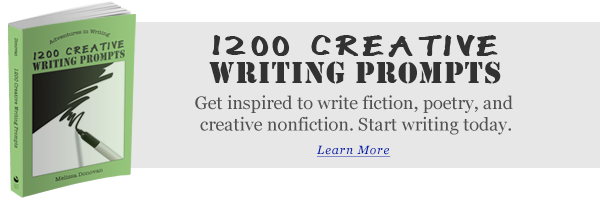
12 Comments
Great ideas for prompts. I’ll be stealing these for my Creative Writing class. Here’s one I came up with for a poetry class I’m teaching this summer. Feel free to try it and give it a more thorough explanation here, if you like it. essentially, the writer goes through his or her twitter feed or Facebook status updates and writes a list of the interesting verbs and nouns, then puts them together in interesting ways to form found poetry or story ideas. Here’s the list I came up with:
http://unapologetic-conjecture.blogspot.com/2011/06/fun-with-words-from-twitter.html
Hi Benjamin. I like the idea of getting word lists from Twitter and using them to prompt a writing session. Thanks for sharing!
Almost every time when I read scientific news I get ideas for my book set in far future. Or when I look at space pictures from Hubble. Sometimes I simply can’t enjoy reading the articles itself – ideas, ideas are coming! 🙂
I know the feeling! I was researching outer space just this weekend. Sometimes, I get so many ideas, it takes me a few days to work out which ones I should use!
I found this very interesting. Woodstock caught my eye because although I was not there the music is from my generation. My mind is overflowing with possibilities………….
Ooh, cool. Woodstock was before my time, but I’m fascinated by the Woodstock culture. There are definitely stories to be told there! Good luck with yours!
And isn’t it convenient that history just repeats itself? 😉
I suppose it could include events in one’s own life? Pretty potent events inspired my entry into fiction.
Of course. Some of the best inspiration comes from real-life experiences.
Speaking of cultural movements, does it seem to anyone else that America has entered a sort of post-Romantic era?
This is from Britannica : “Introspection was inevitable in the literature of an immediately Post-Romantic period, and the age itself was as prone to self-analysis as were its individual authors.”
I don’t think I’d use that description to describe what is happening in America right now. I would call this a divisive era. Dark, dystopian works seem to be popular juxtaposed against commercial art that could be construed as shallow or meaningless ( Hunger Games v. Fifty Shades ). In fact, one might say that there is a struggle between materialism and meaning. We could also call it the post-technology age, where we are challenged to adjust to a new system in which we rely heavily on technology and it has cost lots of jobs.
What a great question, Jesse. It’s given me much to think about. I do believe we are on the cusp of some new era. We live in fascinating times!
Great ideas. Many thanks. I’m filing this.
Submit a Comment Cancel reply
Your email address will not be published. Required fields are marked *
This site uses Akismet to reduce spam. Learn how your comment data is processed .

Subscribe and get The Writer’s Creed graphic e-booklet, plus a weekly digest with the latest articles on writing, as well as special offers and exclusive content.

Recent Posts
- Are You Concerned About Originality in Your Writing?
- Should You Write Fast or Write Well?
- Writing Tips: Kill Your Darlings
- Writing Resources: A Poetry Handbook
- 12 Nature-Inspired Creative Writing Prompts
Write on, shine on!
Pin It on Pinterest
Become a Bestseller
Follow our 5-step publishing path.
Fundamentals of Fiction & Story
Bring your story to life with a proven plan.
Market Your Book
Learn how to sell more copies.
Edit Your Book
Get professional editing support.
Author Advantage Accelerator Nonfiction
Grow your business, authority, and income.
Author Advantage Accelerator Fiction
Become a full-time fiction author.
Author Accelerator Elite
Take the fast-track to publishing success.
Take the Quiz
Let us pair you with the right fit.
Free Copy of Published.
Book title generator, nonfiction outline template, writing software quiz, book royalties calculator.
Learn how to write your book
Learn how to edit your book
Learn how to self-publish your book
Learn how to sell more books
Learn how to grow your business
Learn about self-help books
Learn about nonfiction writing
Learn about fiction writing
How to Get An ISBN Number
A Beginner’s Guide to Self-Publishing
How Much Do Self-Published Authors Make on Amazon?
Book Template: 9 Free Layouts
How to Write a Book in 12 Steps
The 15 Best Book Writing Software Tools
How To Write A Book About War: 8 Tips To Authentic Prose

Ever wondered how to write a book about war? I don’t know where you were that summer night in July of 2017, but hopefully you found a few hours to sit in a dark theater and watch the new film release, Dunkirk . With a 92% tomatometer score , Rotten Tomatoes describes it as an “Extremely powerful and exciting war movie about the evacuation during WW2.”
Writers long to craft powerful, exciting plots that bring in readers and garner standout reviews. In this article, I show you how to write a book about war and provide an eight point, step by step guide to help you. Let’s get into it!
Need A Fiction Book Outline?
Table of Contents
Defining a war book.
Often termed a war novel or known as military fiction , a book about war has its central focus on the battlefield or the home front. Laura Hillenbrand’s Unbroken is a classic, nonfiction example of surviving during war.
Kristin Hannah’s The Nightingale is a bestselling fiction of life on the home front during World War II.
And Unbroken: Path to Redemption is the film sequel displaying Louis Zamperini’s struggle to return to normal life with PTSD and the countless complications that follow soldiers home from war.
When you decide to write a book on war, you do not need to pigeon hole yourself into one time period. Instead, you can choose to write about life on the battlefield, the home front, or returning from war.
Fiction Versus Nonfiction
While fiction and nonfiction vary greatly in most genres, when you write a book on war, both categories should include a factual recounting of historical events.
While Kristin Hannah can create characters of her own, they need to live in environments that could have, or did, actually exist during the war time setting she places them in. In the same way, Laura Hillenbrand had to include strictly factual details about her real-life protagonist’s story. Whether you write fiction or nonfiction, facts are key.
How To Write A Book About War: Things To Include
Just like every genre, there are key factors to include when learning how to write a book about war. I dive deeper in the coming guide, but keep these three aspects top of mind for fiction:
- Include multiple types of conflict
- Include realistic battle scenes
- Include humanized character
For nonfiction, your list is quite similar. Be sure to include:
- The primary conflicts your protagonist faced
- Realistic depictions of their experiences
- Multiple facets of their character
Next up, your step by step guide.
Step By Step Guide
With the above in mind, let’s dive into eight steps you can take as you write a book about war.
#1 – Define Your Primary Focus
There are so many factors to consider when you decide to write a book about war. In fact, it can feel like an insurmountable task to even begin to include every important detail. Instead, focus on the primary goal of your story.
If you write nonfiction, how can you best share an individual’s story or an event? For fiction, what should you focus on most to drive the action?
#2 – Don’t Forget About All Types Of Conflict
Second, when learning how to write a book about war it’s important to understand that your conflict doesn’t only include the setting. There are many types of conflicts you can include: Man against self, man against man, and man against nature.
While a book about war is primarily focused on man against man, consider how you can develop a deep point of view by including the conflict of man against self. This applies for both fiction and nonfiction.
#3 – Use The Senses To Showcase Emotion
It may feel difficult to include the five senses when writing on the topic of war, but it’s important to accurately portray it. Resist the urge to sugar coat the experiences of veterans and those who gave their lives, and instead, use the five senses to realistically display your scenes.
Of course, keep your target audience in mind and recognize that no matter how many edits you make, you can never replicate the experience itself. However, you can do your best to tell an honest story.
#4 – Understand What You’re Writing And How To Write It
Unless you’re writing your memoir or autobiography, you likely don’t have first hand experience about what you will write about. To aid you in this process, consider watching movies about war to visualize battle.
Steven Spielberg’s 1998 film, Saving Private Ryan is a great place to start. Spielberg depicted the Normandy landing so well that the film triggered PTSD in the veterans who watched it . If you write a book taking place on the battlefield, learn how to write battle scenes well.
#5 – Add Humanity To Common Tropes
Every genre has tropes, but when you write a book about war, don’t forget the humanity in the individuals and characters you write about. Louis Zamperini was not only a prisoner of war, he was a living, breathing individual with feelings, fears, hopes, and dreams.
To strip your protagonist of their humanity, particularly if you write nonfiction, is to lessen the weight of their sacrifice.
#6 – Resource Other Books
Simply writing this article is a reminder of the gravity in choosing to write a book about war. It is not an easy topic, so be sure to learn from authors who have gone before you. Read as many books in the genre as possible to get a grip on how to write well.
#7 – Remember You Can Always Edit
With tip number six in mind, remember that when you write a book about war, or any topic, you can always edit your manuscript. Until you send your final draft to the publisher or click publish you can make changes. Do your best to create a great first draft, but you can always:
- Edit your battle scenes
- Add layers of humanity
- Write in more senses
- Include internal conflict
- Fine tune your central focus
Edit, edit, edit.
#8 – Check Your Facts
This should go without saying, but fact checking is so crucial I can’t do less than include it. While you can take some creative liberties when writing fiction, your nonfiction should exactly reflect the details that truly happened.
For instance, if you cover an individual’s experience during the Bosnian War, fact check every detail of both their experience and the events that occurred. For fiction, you can take liberties with your characters’ experiences, but not with the events that occurred.
The Key Is To Begin The Process
If you feel a bit overwhelmed after all of this, simply focus on your first step. What can you do after exiting out of this blog to further your manuscript? Do you need to:
- Decide what perspective character to write from, or what point of view to use ?
- Research important dates?
- Interview an individual?
Every book begins with the first step. You can do this! Feel free to reference this eight-step guide as often as you need to, and if you need further guidance, you may want to watch this video.
Remember, take it one step at a time. Best wishes as you set out on your journey!

Protagonist vs Antagonist: The Difference Explained

Elite Author T. Lynette Yankson Teaches Perseverance in Her Children’s Book About a True Story
Children's Book, Non-Fiction

Elite Author Peder Tellefsdal Is On a Mission to Rebrand the Church with His New Book
Non-Fiction
Join the Community
Join 100,000 other aspiring authors who receive weekly emails from us to help them reach their author dreams. Get the latest product updates, company news, and special offers delivered right to your inbox.
Jump to navigation Skip to content
Search form
- P&W on Facebook
- P&W on Twitter
- P&W on Instagram
Find details about every creative writing competition—including poetry contests, short story competitions, essay contests, awards for novels, grants for translators, and more—that we’ve published in the Grants & Awards section of Poets & Writers Magazine during the past year. We carefully review the practices and policies of each contest before including it in the Writing Contests database, the most trusted resource for legitimate writing contests available anywhere.
Find a home for your poems, stories, essays, and reviews by researching the publications vetted by our editorial staff. In the Literary Magazines database you’ll find editorial policies, submission guidelines, contact information—everything you need to know before submitting your work to the publications that share your vision for your work.
Whether you’re pursuing the publication of your first book or your fifth, use the Small Presses database to research potential publishers, including submission guidelines, tips from the editors, contact information, and more.
Research more than one hundred agents who represent poets, fiction writers, and creative nonfiction writers, plus details about the kinds of books they’re interested in representing, their clients, and the best way to contact them.
Every week a new publishing professional shares advice, anecdotes, insights, and new ways of thinking about writing and the business of books.
Find publishers ready to read your work now with our Open Reading Periods page, a continually updated resource listing all the literary magazines and small presses currently open for submissions.
Since our founding in 1970, Poets & Writers has served as an information clearinghouse of all matters related to writing. While the range of inquiries has been broad, common themes have emerged over time. Our Top Topics for Writers addresses the most popular and pressing issues, including literary agents, copyright, MFA programs, and self-publishing.
Our series of subject-based handbooks (PDF format; $4.99 each) provide information and advice from authors, literary agents, editors, and publishers. Now available: The Poets & Writers Guide to Publicity and Promotion, The Poets & Writers Guide to the Book Deal, The Poets & Writers Guide to Literary Agents, The Poets & Writers Guide to MFA Programs, and The Poets & Writers Guide to Writing Contests.
Find a home for your work by consulting our searchable databases of writing contests, literary magazines, small presses, literary agents, and more.

Poets & Writers lists readings, workshops, and other literary events held in cities across the country. Whether you are an author on book tour or the curator of a reading series, the Literary Events Calendar can help you find your audience.
Get the Word Out is a new publicity incubator for debut fiction writers and poets.
Research newspapers, magazines, websites, and other publications that consistently publish book reviews using the Review Outlets database, which includes information about publishing schedules, submission guidelines, fees, and more.
Well over ten thousand poets and writers maintain listings in this essential resource for writers interested in connecting with their peers, as well as editors, agents, and reading series coordinators looking for authors. Apply today to join the growing community of writers who stay in touch and informed using the Poets & Writers Directory.
Let the world know about your work by posting your events on our literary events calendar, apply to be included in our directory of writers, and more.

Find a writers group to join or create your own with Poets & Writers Groups. Everything you need to connect, communicate, and collaborate with other poets and writers—all in one place.
Find information about more than two hundred full- and low-residency programs in creative writing in our MFA Programs database, which includes details about deadlines, funding, class size, core faculty, and more. Also included is information about more than fifty MA and PhD programs.
Whether you are looking to meet up with fellow writers, agents, and editors, or trying to find the perfect environment to fuel your writing practice, the Conferences & Residencies is the essential resource for information about well over three hundred writing conferences, writers residencies, and literary festivals around the world.
Discover historical sites, independent bookstores, literary archives, writing centers, and writers spaces in cities across the country using the Literary Places database—the best starting point for any literary journey, whether it’s for research or inspiration.
Search for jobs in education, publishing, the arts, and more within our free, frequently updated job listings for writers and poets.
Establish new connections and enjoy the company of your peers using our searchable databases of MFA programs and writers retreats, apply to be included in our directory of writers, and more.

- Register for Classes
Each year the Readings & Workshops program provides support to hundreds of writers participating in literary readings and conducting writing workshops. Learn more about this program, our special events, projects, and supporters, and how to contact us.
The Maureen Egen Writers Exchange Award introduces emerging writers to the New York City literary community, providing them with a network for professional advancement.
Find information about how Poets & Writers provides support to hundreds of writers participating in literary readings and conducting writing workshops.

Bring the literary world to your door—at half the newsstand price. Available in print and digital editions, Poets & Writers Magazine is a must-have for writers who are serious about their craft.
View the contents and read select essays, articles, interviews, and profiles from the current issue of the award-winning Poets & Writers Magazine .
Read essays, articles, interviews, profiles, and other select content from Poets & Writers Magazine as well as Online Exclusives.
View the covers and contents of every issue of Poets & Writers Magazine , from the current edition all the way back to the first black-and-white issue in 1987.
Every day the editors of Poets & Writers Magazine scan the headlines—publishing reports, literary dispatches, academic announcements, and more—for all the news that creative writers need to know.
In our weekly series of craft essays, some of the best and brightest minds in contemporary literature explore their craft in compact form, articulating their thoughts about creative obsessions and curiosities in a working notebook of lessons about the art of writing.
The Time Is Now offers weekly writing prompts in poetry, fiction, and creative nonfiction to help you stay committed to your writing practice throughout the year. Sign up to get The Time Is Now, as well as a weekly book recommendation for guidance and inspiration, delivered to your inbox.
Every week a new author shares books, art, music, writing prompts, films—anything and everything—that has inspired and shaped the creative process.
Listen to original audio recordings of authors featured in Poets & Writers Magazine . Browse the archive of more than 400 author readings.
Ads in Poets & Writers Magazine and on pw.org are the best ways to reach a readership of serious poets and literary prose writers. Our audience trusts our editorial content and looks to it, and to relevant advertising, for information and guidance.
Start, renew, or give a subscription to Poets & Writers Magazine ; change your address; check your account; pay your bill; report a missed issue; contact us.
Peruse paid listings of writing contests, conferences, workshops, editing services, calls for submissions, and more.
Poets & Writers is pleased to provide free subscriptions to Poets & Writers Magazine to award-winning young writers and to high school creative writing teachers for use in their classrooms.
Read select articles from the award-winning magazine and consult the most comprehensive listing of literary grants and awards, deadlines, and prizewinners available in print.

- Subscribe Now
The Literature of War
- Printable Version
- Log in to Send
- Log in to Save


First World War postcard published by ‘The Cairo Postcard Trust’ (© Lyn Edmonds)
We received entries from all over the world – Britain, Ireland, France, India, Pakistan, Serbia, Australia and New Zealand – and were struck by the multiple viewpoints and the wide range of styles, but also by the focus on the stories of individual people, which brought the wider history to life.
Congratulations to our winners! We hope you enjoy reading their work. Click on the PDF page next to the citations below to open the short story or poem. Here you can read all the shortlisted entries . Copyright remains with the authors.

11-18 category
Winner: ‘heat’ by constance cottrell.
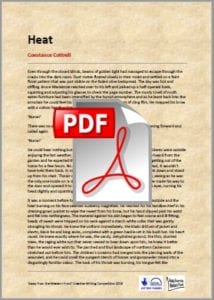
Runners up: ‘The Long Road East’ by William Bowden-Ritchie and ‘Welcome to East Africa’ by Charlotte Lee
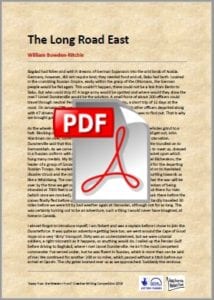
Highly Commended (in alphabetical order)
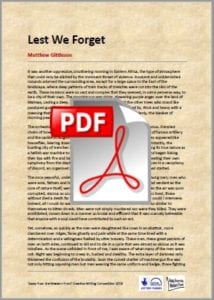
‘Lest We Forget’ by Matthew Gittleson. The central idea of this story, that the actions of humans on the battlefield seem inexplicable and contrary to nature, is very well expressed. Using a tree as the voice of the author allows us to step back from the human experience and become more objective. The action is placed in the East African campaign and the writer picks out the extraordinary valour of the colonial soldiers who fought for the British and German empires.
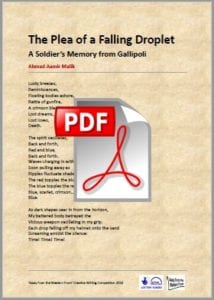
‘Long Live War’ by Ishaabyha Tripathi. As a piece of creative writing this entry focusses on one simple idea and uses this to epitomise the writer’s experience of the war away from the Western Front, where the majority of troops on both sides were colonial, and many of them – as described – not English speakers. The entry also manages to convey something of the contradictions of war, along the lines of ‘Oh What A Lovely War’, where soldiers become ironic and fatalistic about their situation. This is all the more poignant in the choice of writer, who cannot appreciate the irony due solely to lack of knowledge of the language.
Over 18 category
Winner: ‘buried letters’ by helen parker-drabble.
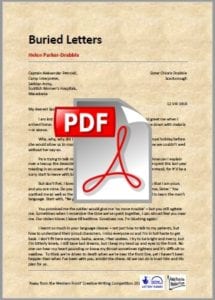
An audio version of ‘Buried Letters’
Right click here to download it as an MP3 file
Runners-up: ‘The Princess Beatrice’ by Antony Dunford and ‘The Cheecha’ by Peter Susa
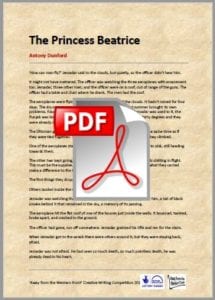
‘The Syrian’ by Patty Lafferty. The simple idea that history is repeating itself in Syria is well expressed. The poem uses short lines and vivid images to take the reader through the experience of waking up after being wounded in war. The historical context is clear and the references to T E Lawrence and Feisal place the action in its time.
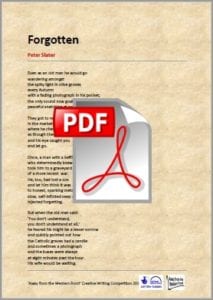
Our competition originally had three age categories – ’10 and under’, ’11-18′ and ‘Over 18′. Unfortunately in the ’10 and under’ category we received no entries which complied with the rules so we took the decision to transfer the value of the prizes to the other categories, and were therefore able to offer book tokens to two runners-up as well as the winning entry.

Contemporary Writing on War and Conflict
- World War One: Projects to Mark the Centenary
- September 2014 - December 2018
This project examines the contemporary war experience as reflected by writers, poets, journalists and bloggers, and interrogate how we write about war and conflict today in contrast to the writing that was written on WW1.
Thought pieces from leading contemporary UK writers are a starting point for international public discussions. Looking at questions such as: What is the role of the writer in responding to conflict? What feels like an appropriate amount of time before creating an artistic response to war? Who do we trust to write about war? What we accept as war literature today, and how this is influenced by its context and changing global situations. How do we capture the human experience of war?
Caroline Wyatt on reportage
Patrick Hennessey on memoir
Helen Dunmore on fiction,
Owen Sheers on poetry
Ben Hammersley on digital writing
Helen Dunmore was the first winner of the Orange Prize and is also an acclaimed children's author and poet. She has published twelve novels including Zennor In Darkness , winner of the Mckitterick Prize; A Spell Of Winter , winner of the first Orange Prize; The Betrayal , longlisted for the Man Booker prize, shortlisted for the Orwell Prize and the Commonwealth Writers Prize; The Greatcoat (2012) and The Lie (2014). Helen Dunmore has also published three collections of stories, Love Of Fat Men, Ice Cream and Rose 1944 , and her stories have been widely broadcast and anthologised. Her children's novels include the INGO series, published by harpercollins and shortlisted for the Nestlé Smarties Book Prize. Her ten poetry collections include The Raw Garden, Out Of The Blue and The Malarkey , all published by Bloodaxe Books. She spoke on the theme of war in her work at events in Russia at the Krasnoyarsk Book Fair 1-4 November 2014 along with Nigel Farndale (who spoke about the research he undertook on the First World War for his novel The Blasphemer ) and Imtiaz Dharker (who talked about her response to Wilfred Owen’s Anthem of Doomed Youth in the collection of poems 1914 Remembers ).
Patrick Hennessey was born in 1982 and educated at Berkhamsted School and Balliol College, Oxford, where he read English. On leaving university he joined the Army and served from 2004 to 2009 as an officer in The Grenadier Guards. In between guarding towers, castles and palaces he worked in the Balkans, Africa, South East Asia, the Falkland Islands and deployed on operational tours of Iraq and Afghanistan. On leaving the Army he wrote his first book, The Junior Officers’ Reading Club , a memoir of a brief but eventful stint in uniform; followed by Kandak an account of how unlikely alliances can be forged in the intensity of battle. Patrick is now a barrister.
Owen Sheers has written two collections of poetry, The Blue Book and Skirrid Hill , which won a Somerset Maugham award. His verse drama Pink Mist won Wales Book of the Year and the Hay Festival Poetry Medal. Non-fiction includes The Dust Diaries and Calon: A Journey to the Heart of Welsh Rugby . His first novel Resistance has been translated into ten languages and was made into a film in 2011. His plays include The Passion, The Two Worlds of Charlie F and Mametz , which has been longlisted for the Dylan Thomas Prize 2014. His second novel, I Saw A Man , is published by Faber & Faber in 2015.
Ben Hammersley is an author, futurist and technologist specialising in the effects of the internet and the ubiquitous digital network on the world’s political, cultural and social spheres. He enjoys an international career as a trends and digital guru, explaining complex technological and sociological topics to lay audiences, and as a high-level advisor on these matters to governments and business. Ben Hammersley is a Fellow at The Brookings Institute in Washington DC, a fellow at the Robert Schuman School of Advanced Study at the European University Institute in Florence, Italy, and Innovator-in-Residence at the Centre for Creative and Social Technologies, Goldsmiths, University of London. He is contributing editor of WIRED Magazine and writes regularly for the international media including The Financial Times .
Caroline Wyatt became the BBC’s Religious Affairs Correspondent in August 2014, having been a BBC Defence Correspondent from 2007. Prior to that, she covered UK operations in Iraq from 2003 and in Afghanistan from 2001. From 2003 - 2007, Caroline was BBC Paris correspondent, and before that spent three years as Moscow Correspondent, charting Vladimir Putin's first term as Russian President. She also covered NATO in Kosovo in 1999, and Russian operations in Chechnya, as well as working in Gaza and the wider Middle East for the BBC in the late 1990s and early 2000s. She is also an occasional presenter for R4 The World Tonight and Saturday R4 PM. She contributed to 'The Oxford Handbook of War', R4’s ‘More from Our Own Correspondent’ and ‘Only Remembered’, a children’s anthology edited by Michael Morpurgo looking at the literature of WW1.
Sign Up to the Newsletter
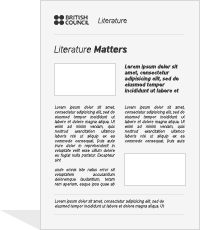

A short guide to writing war novels

Writing software you'll actually love
Outlining tools
Advanced goal setting
Project templates
Collaboration
Compare plans

War novels have long fascinated readers with their gripping accounts of heroism, tragedy, and the human condition. As a writer, it is crucial to understand external content genres like the war novel in order to craft a compelling narrative that appeals to readers. This guide will explore the conventions, obligatory scenes, and tips for writing a successful war novel.
What is the war genre?
The war genre in fiction focuses on the experiences of soldiers and civilians during times of war. These stories often explore themes of heroism, sacrifice, loss, and the impact of war on individuals and society. Examples of war fiction include "All Quiet on the Western Front" by Erich Maria Remarque, "The Things They Carried" by Tim O'Brien, and "Catch-22" by Joseph Heller.
The war genre is one of the external content genres , which focuses on the external conflicts and events that drive the story. Understanding the external content genre helps you develop stories that meet reader expectations and deliver a satisfying experience.
When to choose the war genre
Choosing the war novel genre for your story can be an excellent decision if you want to delve into themes of courage, sacrifice, and the human experience when facing adversity. Consider the historical context, themes, and ideas you want to address, and evaluate your familiarity with the genre to determine if a war novel is the best way to convey your message and captivate your audience.
Conventions of the war genre
The war novel genre is characterized by several key conventions:
- Setting: War novels typically take place during a specific historical conflict or war, whether real or fictional.
- Protagonist: The protagonist is often a soldier or civilian caught up in the conflict, facing extraordinary challenges and hardships.
- Conflict: War novels depict the physical, emotional, and moral struggles experienced by the protagonist and those around them.
- Themes: Common themes in war novels include courage, sacrifice, loyalty, survival, and the impact of war on individuals and societies.
- Tropes: Expect to encounter battles, camaraderie among soldiers, military hierarchy, and the civilian experience in a war novel.
- Tone and atmosphere: War novels often have a somber, intense, and emotionally charged atmosphere that immerses readers in the story.
Obligatory scenes of the war genre
There are certain scenes that readers expect to encounter in a war novel:
- The introduction of the protagonist and their motivations for joining or being involved in the conflict.
- A depiction of the brutal reality of war, including battles, injuries, and the loss of comrades or loved ones.
- Moments of camaraderie and bonding between the protagonist and their fellow soldiers or civilians.
- A turning point or crisis that tests the protagonist's courage, loyalty, and convictions.
- The resolution of the conflict, whether through victory, defeat, or a return to civilian life, and the protagonist's reflection on the impact of the war on their life and beliefs.
Tips for writing a compelling war novel
To create a captivating war novel, consider the following tips:
- Conduct extensive research on the historical context, military tactics, and cultural nuances of the era to ensure your story is authentic and accurate.
- Develop engaging and complex characters with distinct personalities, motivations, and backstories that readers can connect with.
- Create a vivid and immersive setting that transports readers to the front lines, using rich descriptions and sensory details.
- Craft an engaging plot with twists and turns that maintain reader interest and build suspense throughout the story.
- Use authentic language and dialogue that reflects the time period and the experiences of those involved in the conflict, while remaining accessible to modern readers.
To craft a war novel that meets reader expectations and allows your unique voice to shine, it's essential to understand the conventions and obligatory scenes of the genre. You should also remain sensitive to the experiences of those who have lived through war and approach the topic with respect and empathy. With dedication and careful attention to detail, you can contribute to the rich tradition of war literature and create a story that resonates with readers for generations to come.
- Coyne, Shawn. 2015. The Story Grid. New York, NY: Black Irish Entertainment.
Related posts
You should be writing, but since you're here why not read more articles on this topic?

3 questions to help you figure out your theme

How theme and mood work together

Symbols & motifs in story

Understanding the controlling idea/theme of your story
- NONFICTION BOOKS
- BEST NONFICTION 2023
- BEST NONFICTION 2024
- Historical Biographies
- The Best Memoirs and Autobiographies
- Philosophical Biographies
- World War 2
- World History
- American History
- British History
- Chinese History
- Russian History
- Ancient History (up to 500)
- Medieval History (500-1400)
- Military History
- Art History
- Travel Books
- Ancient Philosophy
- Contemporary Philosophy
- Ethics & Moral Philosophy
- Great Philosophers
- Social & Political Philosophy
- Classical Studies
- New Science Books
- Maths & Statistics
- Popular Science
- Physics Books
- Climate Change Books
- How to Write
- English Grammar & Usage
- Books for Learning Languages
- Linguistics
- Political Ideologies
- Foreign Policy & International Relations
- American Politics
- British Politics
- Religious History Books
- Mental Health
- Neuroscience
- Child Psychology
- Film & Cinema
- Opera & Classical Music
- Behavioural Economics
- Development Economics
- Economic History
- Financial Crisis
- World Economies
- Investing Books
- Artificial Intelligence/AI Books
- Data Science Books
- Sex & Sexuality
- Death & Dying
- Food & Cooking
- Sports, Games & Hobbies
- FICTION BOOKS
- BEST NOVELS 2024
- BEST FICTION 2023
- New Literary Fiction
- World Literature
- Literary Criticism
- Literary Figures
- Classic English Literature
- American Literature
- Comics & Graphic Novels
- Fairy Tales & Mythology
- Historical Fiction
- Crime Novels
- Science Fiction
- Short Stories
- South Africa
- United States
- Arctic & Antarctica
- Afghanistan
- Myanmar (Formerly Burma)
- Netherlands
- Kids Recommend Books for Kids
- High School Teachers Recommendations
- Prizewinning Kids' Books
- Popular Series Books for Kids
- BEST BOOKS FOR KIDS (ALL AGES)
- Ages Baby-2
- Books for Teens and Young Adults
- THE BEST SCIENCE BOOKS FOR KIDS
- BEST KIDS' BOOKS OF 2023
- BEST BOOKS FOR TEENS OF 2023
- Best Audiobooks for Kids
- Environment
- Best Books for Teens of 2023
- Best Kids' Books of 2023
- Political Novels
- New History Books
- New Historical Fiction
- New Biography
- New Memoirs
- New World Literature
- New Economics Books
- New Climate Books
- New Math Books
- New Philosophy Books
- New Psychology Books
- New Physics Books
- THE BEST AUDIOBOOKS
- Actors Read Great Books
- Books Narrated by Their Authors
- Best Audiobook Thrillers
- Best History Audiobooks
- Nobel Literature Prize
- Booker Prize (fiction)
- Baillie Gifford Prize (nonfiction)
- Financial Times (nonfiction)
- Wolfson Prize (history)
- Royal Society (science)
- Pushkin House Prize (Russia)
- Walter Scott Prize (historical fiction)
- Arthur C Clarke Prize (sci fi)
- The Hugos (sci fi & fantasy)
- Audie Awards (audiobooks)
Make Your Own List
Nonfiction Books » Politics & Society » War
The best war writing, recommended by kate mcloughlin.
War writing extends to all sorts of genres, including blogs and Twitter. Oxford University's Professor Kate McLoughlin , author of Authoring War: The Literary Representation of War from the Iliad to Iraq recommends some of her favourite books of war writing.
Interview by Beatrice Wilford
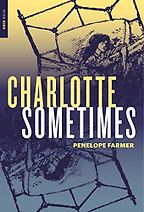
Charlotte Sometimes by Penelope Farmer
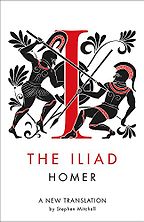
The Iliad by Homer

War and Peace by Leo Tolstoy
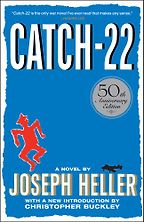
Catch 22 by Joseph Heller
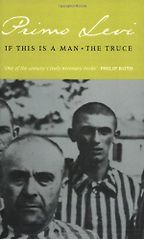
If This Is a Man by Primo Levi

1 Charlotte Sometimes by Penelope Farmer
2 the iliad by homer, 3 war and peace by leo tolstoy, 4 catch 22 by joseph heller, 5 if this is a man by primo levi.
Y ou’ve chosen three novels, a memoir and a poem. Which other genres come under the umbrella of war writing?
Does writing about war, in the vein of someone like Hemingway, ever glamorise it? And is there a vein that does the opposite?
Yes. It’s possible to split war writing into pro-war writing and anti-war writing and that can depend on the culture at the time, or it can depend on the individual’s view.
Hemingway obviously thought war was a great thing. Outside war, he liked hunting, fishing and shooting. Killing things was his thing and a war was a natural environment for him. That’s not to say that he thinks that war is an unmitigated good. For Whom the Bell Tolls and A Farewell to Arms show the human cost of war as well, and the political cost of war, and the futility of it.
“The blog has taken over from the epic as the war-writing genre of choice.”
I suppose it’s rare to find anything that says war is a good thing without it being questioned at all. But some of the earlier texts celebrate heroism in battle unquestioningly.
How do writers deal with the horrors of war?
There is some incredibly graphic description of what goes on in war and among the most graphic is one I’ve chosen, the Iliad , where there are descriptions of horrific injuries. Another way of describing the horrors of battle is by indirection. Describing, for example, all the people who didn’t get funerals in the First World War—as Wilfred Owen does in ‘ Anthem For Doomed Youth ‘—is a way of conveying death and loss and bereavement on a mass scale.
Is there a clear gender divide in written perspectives on war?
Yes, I think there is. There’s a concept famous among academics who work on war writing called ‘combat gnosticism,’ gnosticism meaning knowledge. It’s the idea that only people who’ve been in combat have earned the right to write about it. And it seems pretty unique to war as a phenomenon. You would think something like childbirth would be similar, but it seems not. It’s war: you have to be in it to be able to write about it according to some people. That has led to there being a canon built up of combatant writing. Especially, for example, the First World War and the trench poets. Of course that has implications for that section of humanity who don’t get to fight in armed combat: women.
I think there are only two armies—the Israeli and the Russian—in which women, even now, can fight as ground forces. That means women have been banished and talk about another angle: the folks back at home, the hospitals, the orphans, the widows, the more sentimental aspects of war. But you get some incredibly feisty women who fight their way to the front anyway, who don’t take no for an answer, stow away, just turn up and who write remarkable reportage—and of course that’s not to overlook the role of the imagination in all of this. Being in war, actually having that combative experience, you might get too close and need more of a detached perspective.
I think the gendering of war writing is about different kinds of experience, but not different kinds of validity of experience.
You’re currently writing about modern warfare. Your most recent book choice is Charlotte Sometimes , written in 1969. How has war writing changed in this time?
The book I’m working on at the moment is called Veteran Poetics . It’s an exploration of certain philosophical ideas—self, experience and storytelling—in the age of modern mass warfare, which I date from 1793 as that’s when the French issued their levée en masse : mass conscription. I think the French Revolution and Napoleonic wars were when war became modern, globalized, industrialised and mass.
I also think that was different from anything that had gone before. Walter Benjamin famously said in his essay “The Storyteller”, “men came back from the First World War, not richer but poorer in communicable experience.” I think he got the date wrong, I think it was actually the Napoleonic and French Revolutionary wars. He conveys this sense of having had an experience that you can’t describe because there’s literally nothing to compare it with, and I think that’s a very modern feeling. I think that’s almost a unique feeling to modernity.
The books I’m looking at for my veterans book wouldn’t necessarily qualify as obvious war writing. The most recent ones are by JK Rowling, her Cormoran Strike series, because they feature a detective who’s a veteran. I trace that figure back to Lord Peter Wimsey and to Dr Watson. I’m looking at how veterancy becomes a means of expressing a certain kind of problem solving, not the forensic problem solving of Sherlock Holmes but the more ‘university of life’ understanding of Dr Watson.
Your first book is Charlotte Sometimes by Penelope Farmer.
This book is the first war book I read and it made a deep impression on me. I read it when I was about nine or ten. It’s a book for children , published in 1969. The Charlotte of the title is a twelve year old girl who goes to boarding school and goes to sleep in a dormitory in a bed which has a funny set of wheels on it, and wakes up fifty years earlier in 1918. She has swapped places with a girl called Clare, who in 1918 was sleeping in the same bed. We don’t hear from Clare’s point of view, what she makes of 1969 or 1968, but we do hear about Charlotte, who finds herself in the final year of the First World War .
They swap backwards and forwards night after night. The plot twist is that Charlotte gets stuck in 1918. She and her younger sister are evacuated to a house where the son has gone to war thinking it was going to be a fantastic military heroic adventure, and it turns out it wasn’t. They play with his toy soldiers and the family hold a séance. It made a huge impression on me because Penelope Farmer has this incredibly deft way of making you get a sense of the shock Arthur feels on going to war and finding it was nothing like his toy soldiers and his ideas of bravery.
There is another poignant moment surrounding a teacher in the 1918 school called Miss Wilkins. She’s very bright—a little bit plump, she’s sort of birdy and beady—and Charlotte likes her very much. When she eventually gets back to her own time there’s a Miss Wilkins who’s white haired and a different person altogether, her fiancé died in the First World War. It’s a way of showing how, without being graphic in the slightest, this enormous worldwide conflict had very personal consequences. I think it’s an extraordinary novel and a very thought-provoking one, with many interesting details for children to use to think about war.
What should we tell children about war?
You don’t want to overwhelm children with the seriousness and magnitude of war, but on the other hand there are children who have no choice but to live through war. The children who are told about it are the lucky ones. But I think doing it in this way, having details of the home front, makes it extremely vivid.
There are other fantastic war books for children. Carrie’s War by Nina Bawden is another good example. That also involves an evacuation. It is dear to my heart because my dad was an evacuee. That sense of the impact of war on children comes across very convincingly, very vividly.
As you describe, this book has a very complex temporal framework. How does war alter our experience of time, and how does writing seek to reflect this?
Let’s move on to your second book, the Iliad .
The Iliad is absolutely extraordinary. I read it every so often, and from the beginning it has the most incredible evocation of place, on the beach with the camp fires and Achilles sulking in his tent. There’s such a sense of camaraderie between these warriors. It’s an ancient culture, completely foreign to us now, and yet somehow we are brought to feel their day-to-day emotions. Not just on the Greek side, on the Trojan side as well. There are poignant moments, for example where Hector’s going in to fight and his wife Andromache doesn’t want him to. It’s an extraordinarily vivid account of war and a very graphic one.
Get the weekly Five Books newsletter
The edition I read it in first, and still read it in, is E. V. Rieu’s Penguin Classics translation. When I’m doing my academic work, I check it against the Loeb Classic edition where it’s very literally translated. Rieu fought in the First World War. He was in the Maratha Light infantry in India and then in the Second World War he was in London in the Blitz, when he decided to start translating the Odyssey . He did the Odyssey first and then the Iliad . This is a veteran in war, translating the great book of war.
How has the Iliad influenced and shaped the genre of war writing?
It continues to inspire. There have been so many writers who have been influenced by it. For an epic, it manages to do both things: it has an enormous scope, but then it really focuses in. To write vividly about battle you need that human interest angle. Monomachia or hand-to-hand fighting comes out in other much later works of war literature, which focus on a single individual and their fate in war.
I’m thinking now of C.S. Lewis in Surprised By Joy . He fought in the First World War and when he got to the western front he said, “This is war, this is what Homer saw.” I’m sure it was nothing like it actually, it’s dubious whether Homer was one single person and it’s unclear whether he could see. But it still carries the weight of all these centuries of cultural baggage.
Having influenced war writing; do you think the Iliad influenced the way people fought in wars?
Book number 3 is War and Peace by Leo Tolstoy . Don’t people only read it for the peace bits? Because the war bits can be quite boring, people say.
The last hundred pages are dull, but if you can stick out the first 1200, then you might as well stick out the last. For the first 1200, it’s a kind of ebb and flow between war and peace, and I think each is equally engaging. When you get to the war parts, Tolstoy is always having the characters think about how they can talk about war. So Nikolai Rostov has these very heroic ideas of going into battle, but then it’s not quite as heroic as he imagined, it doesn’t go as well as he thought, and then when he’s asked to talk about it he realises his listener seems disappointed, so he very quickly slips into a standard heroic war tale. Tolstoy didn’t fight in the Napoleonic wars, but he did fight in the Crimean war, so he drew on his experiences in that when he wrote War and Peace .
Yes, it’s not about the time that he’s writing in. How common is writing written post conflict? What difference is there between this and writing written in a conflict?
That’s true of most of the choices here. Tolstoy is writing in the 1860s about the beginning of the nineteenth century, Homer is writing about an imaginary war, Joseph Heller’s Catch-22 is published in 1961 and it’s about the Second World War . Penelope Farmer was writing a good fifty years after the First World War . I think people do write about previous wars and partly it’s a way of avoiding contemporary rawnesses.
Let’s move on to Catch 22 , tell me about this book.
This is the great war book of the twentieth century. It’s laugh-out-loud funny. He’s talking about the Second World War , which is thought of as the good war. He picks up on an aspect of war which has gone on since Homer. You have an overarching war strategy which might make sense, but, for the individual, the things they’re asked to do can seem absolutely ludicrous — in this case to fly death-defying, practically suicidal missions. It’s completely illogical, being in the war zone. He captures that brilliantly: through repetition, through completely farcical situations and through extremely harrowing moments as well.
Is comedy antithetical to war, or is it a useful lens through which to look at the experience of war?
Laughter and war are almost natural companions. But I wouldn’t say laughter implies funniness or a lack of seriousness, and nor does comedy. Catch-22 gets you to the point where you can’t apply your reason any more and laughter takes over. It’s the laughter of the absurd which might not be to do with funniness, but is to do with preposterousness or incongruity or disbelief. It’s that kind of, “I can make no sense of this,” laughter and I think evoking it is incredibly skilful.
Another person who does it is Spike Milligan. I love his war memoirs. The first one is Hitler: My Part in His Downfall . Just the title conveys the ridiculous. He is one person who mostly spends his Second World War in Bexhill-on-Sea doing maneuvers.
Catch 22 also has some very visceral descriptions of the horrors of war. How successfully does he convey those experiences and what are their purpose in this book?
He does convey them graphically. He makes it absolutely clear that man is mortal. A character gets chopped in half and there’s someone else who’s horribly wounded in an air accident and you find out the contents of his stomach. It’s literally visceral, his kidneys are there with the tomatoes he had for breakfast. He’s very good at conveying that sense of the absolute mortality and carnality of the human body.
“There’s nothing like war to show the fragility of the human body, its destructibility.”
There’s a recurring character called the Soldier in White, who’s a soldier in the hospital completely encased in white plaster cast. In another scene the characters discover the solder in white is gone and an identical one is in his place. Although his arms are different lengths and his body’s a different length, he’s still encased in white, so there will always be a Soldier in White. People become absolutely indistinguishable from one another, which conveys this sense of man as organic matter. There’s nothing like war to show the fragility of the human body, its destructibility.
There’s the amazing description of the Blitz in Kate Atkinson’s Life after Life . The narrator sees a body that she thinks is clothes on a coat hanger because it’s just hanging there.
I was stunned by Life After Life . I think that idea of the world turned upside down, and particularly the house turned inside out, is quite common. I can only imagine what it must feel like to have an intimate room like the bedroom suddenly on show in the street, and have all your possessions out in the street. It’s the complete opposite of civilized living. Writers use it quite often, “ The Land-Mine ” by George Macbeth described how the war has ripped off the front of houses.
Your final book is If This Is a Man by Primo Levi.
I first read this in my twenties. It was my introduction to the Holocaust . This is when I began to understand what the Holocaust had been. Primo Levi was an Italian Jew and an industrial chemist who was sent to Auschwitz. It is about his existence in Auschwitz. Reading it, horror follows horror. It’s hard to believe that the human frame can survive under such circumstances, let alone survive to write something like this.
There are two moments in it that particularly struck me. Auschwitz is in Poland and it’s winter. The hard labour is extremely difficult and it is very cold and bitter. The prisoners are going to be synthesizing rubber in a factory near to Auschwitz, so there is a chemistry exam. And it’s the most infernal exam in the world. This person who has been reduced to something that is almost sub-human now has to try and remember his chemistry from his degree. If he can remember he will be able to work inside in the warmth, and he won’t die. There’s something about being a scholar and thinking about your knowledge under such circumstances that is very powerful.
Support Five Books
Five Books interviews are expensive to produce. If you're enjoying this interview, please support us by donating a small amount .
He does get to work in the factory, which probably saves his life. There is a scene in which he is going with a very young prisoner to get soup and suddenly a line from Dante’s Inferno comes to his mind. It’s the Ulysses canto, where Ulysses is saying, “I’m not meant for men like these but men who strive after excellence” and Primo Levi tries to remember it. Trying to remember it is this moment of confirmation that he’s still human. The young man he is with is French and doesn’t see what he’s talking about, but senses that it is really important. Levi doesn’t remember the whole canto, but he remembers enough snatches of it that he’s just about got it. I’d like to say that this proves the enduring, humanising power of literature, but I’m not sure you can. George Steiner has pointed out in his great book Language and Silence that people who read Goethe and listened to Schubert in the morning then went out and did their work as guards at Auschwitz. So I don’t think literature improves you. Nonetheless, it is a moment worth registering because it is this remembrance that means so much to him and he says, “I would give my day’s soup ration to remember that line.” You’d have to read this account to know how much a day’s soup ration matters.
This makes me think of Elaine Scarry’s The Body In Pain and her idea that if you reduce somebody to just a cipher or symbol of your own power through causing them pain it involves that removal of self. I think it’s a very coherent way of thinking about that loss of humanity–you remove the inner life and you make them simply a body.
Yes, I absolutely agree with that. The writing of this, and similar Holocaust memoirs, is a reaffirmation, it goes back to combat gnosticism. It’s hard for anyone who hasn’t been in that situation to talk about reaffirmation, because it’s hard to imagine just what you would have to come back for.
How does he approach the writing of the truly unspeakable?
He writes with extreme candor and a remarkable lack of self-pity. I think there’s this sense, in theories of representations of the Holocaust, that if you deviate even slightly from the truth then you risk letting in the deniers. And so the place of literature in relation to the Holocaust is a very delicate subject. As readers, we have to be very, very aware of the potential of slipping into sentimentality, or trying to make something good out of it that just isn’t there
Does our knowledge of his suicide in any way alter the experience of reading his writing?
In a way it just makes the bravery of the writing—not only of If This Is A Man but all his other works, which never leave this subject—the more extraordinary. There is something about surviving to bear witness, it is an incredibly brave thing to do. He strikes me as an absolutely heroic person.
You’re writing now about literature and silence, how can silence creep into literature? Might it be the purest expression of a horrific event?
My next project is going to be about literature and silence. It grows out of the last chapter of the book I’m writing on veterans which is called “The End of the Story”. The penultimate chapter is about veterans who never stop talking about the war as a model of literary creativity. And the final chapter is about veterans who won’t say anything or can’t say anything or don’t say anything.
We neglect the silences in literature. I’m interested in the acoustic use of silence in poetry or drama and in things that aren’t said, and how we know they’re not said. It’s terribly difficult if you’re not going to say something or write something in protest, how do you register that? You’ve got to sort of hedge it round with words. But I think we can try and listen to those silences.
And silences, as we know from the two minute silence, are incredibly powerful. I want to try and understand this better, and understand how we can see silences in texts that are there, and also maybe texts that aren’t there, or texts that aren’t as they would have been. It’s looking into the realm of the subjunctive, into the hypothetical, into the not said.
February 12, 2016
Five Books aims to keep its book recommendations and interviews up to date. If you are the interviewee and would like to update your choice of books (or even just what you say about them) please email us at [email protected]
Kate McLoughlin
Kate McLoughlin is Associate Professor of English at Harris Manchester College, Oxford. Her books include Authoring War: The Literary Representation of War from the Iliad to Iraq (2011) and Martha Gellhorn: the War Writer in the Field and in the Text (2007). She is a former government lawyer, an Associate of the Royal College of Music in piano performance, and a poet: her collection Plums came out in 2011.
We ask experts to recommend the five best books in their subject and explain their selection in an interview.
This site has an archive of more than one thousand seven hundred interviews, or eight thousand book recommendations. We publish at least two new interviews per week.
Five Books participates in the Amazon Associate program and earns money from qualifying purchases.
© Five Books 2024

How to Write Authentic War Stories: Really Useful Links by Lucy O’Callaghan

Lucy O'Callaghan
- 25 April 2024
Although fiction is making things up, there are sometimes places where we need to get the facts right. Writing stories set in war times is one of those. People have to believe in the authenticity of your war time story. It may be a fictional story but things within the story must ring true – the smell of dug outs or what crowded bomb shelters were like, and the timeline of events throughout the war. I have put together some articles and podcasts with advice on how to write authentic war stories.
- 7 Tips For Writing Realistic War Stories (UPDATED 2024) (writersrelief.com)
This article gives advice on how graphic to be when writing battle scenes. Violent scenes can be offensive if they are overdone or unnecessary. If you are writing about violence, make sure you are aware of your choices and the reasons for making them. Often using a panoramic lens on a scene can give your reader a chance to look around and see what’s going on. Another tip shared is to pay attention to the details of everyday life at that time. It’s not all the smell of bombs, but often the smell of certain foods that can place us in history. While every genre has it tropes, falling back on liches is sometimes the easy way out. Try and add your own unique perspective. And last but not least, read widely non-fiction in your chosen area, check your facts and do your research. Doing this will further strengthen your story.
- How To Write A Book About War: 8 Tips To Authentic Prose (selfpublishing.com)
A book about war has its central focus on the battlefield or on the home front. This article from Selfpublishing.com shares things to include when writing about war. Just like writing about any genre, there are key factors to include, and these three aspects are important: including multiple types of conflict, realistic battle scenes and humanised characters. The article moves on to share a step-by-step guide you can take as you write a book about war. These include, defining your primary focus, don’t forget about all types of conflict – it’s not always man v man, use the senses to showcase emotion, understanding what you are writing and how you write it, add humanity to common tropes, resource other books, edit and check your facts.
- Telling the Stories of War: Author Roundtable – Writer’s Digest (writersdigest.com)
Writing accurately and truthfully about war is never easy. Writing about conflicts that occurred decades and even centuries earlier is even more difficult. This is an interesting article from Writer’s Digest where three award-winning journalists discuss their unique approaches to chronicling seminal moments in American military history. They discuss their research, the challenges they faced, their writing processes, and facing structural difficulties.
- A short guide to writing war novels (firstdraftpro.com)
War novels have long fascinated readers with their gripping accounts of heroism, tragedy, and the human condition. As a writer, it is crucial to understand external content genres like the war novel in order to craft a compelling narrative that appeals to readers. This guide from First Draft Pro explores the conventions, obligatory scenes, and tips for writing a successful war novel.
- 6 Tips on Writing a War Story – Edit911 Editing Service
War stories are multifaceted, emotional, and full of conflict. War is a popular and captivating genre. However, writing about war is challenging. Whether it’s contemplating if your descriptions are too graphic or not violent enough, not knowing how much detail to go into, or writing intense battle scenes, war stories are notoriously difficult to master. While there’s no specific formula to writing a good war story, there are tips that can make the topic less intimidating. This article outlines some of these tips to ensure your war story is a nuanced and well-written one. It advises you to understand what a war story is, do your research and get the facts straight, use all types of conflict, know when to use and avoid tropes, don’t be afraid of using emotions, and write realistic battle scenes.
The podcasts this week feature stories about various wars which may help you in your research.
- 10 Best War Podcasts for Every Military History Buff (explorethearchive.com)
The Archive shares ten great podcasts on different areas of historical wars.
- WW2 Stories & Real War Stories | Listen to Podcasts On Demand Free | TuneIn
These stories are all about World War Two. This podcast dives into the untold tales of heroism, sacrifice, and determination from
“WW2 Stories & Real War Stories” is a gripping podcast that dives into the untold tales of heroism, sacrifice, and determination from the most significant conflict in human history, World War II. Each episode explores the lesser-known battles, daring missions, and personal accounts of the brave individuals who shaped the course of the war.
- Amazing War Stories Archives – Amazing War Stories
Using the latest 3D audio technology we tell inspiring true stories each taken from the museums we feature on our site.
I hope you have found this week’s column helpful. As always, please get in touch if there are any topics you would like me to cover.
(c) Lucy O’Callaghan
Instagram: lucy.ocallaghan.31.
Facebook: @LucyCOCallaghan
Twitter: @LucyCOCallaghan
About the author
Writing since she was a child, Lucy penned her first story with her father called Arthur’s Arm, at the ripe old age of eight. She has been writing ever since. Inspired by her father’s love of the written word and her mother’s encouragement through a constant supply of wonderful stationary, she wrote short stories for her young children, which they subsequently illustrated. A self-confessed people watcher, stories that happen to real people have always fascinated her and this motivated her move to writing contemporary women’s fiction. Her writing has been described as pacy, human, moving and very real. Lucy has been part of a local writing group for over ten years and has taken creative writing classes with Paul McVeigh, Jamie O’Connell and Curtis Brown Creative. She truly found her tribe when she joined Writer’s Ink in May 2020. Experienced in beta reading and critiquing, her debut novel, The Lies Beneath is out now, published by Poolbeg. Follow her on Instagram: lucy.ocallaghan.31. Facebook and Twitter: @LucyCOCallaghan

Subscribe to our newsletter
Get all of the latest from writing.ie delivered directly to your inbox., featured books.

Your complete online writing magazine.
Guest blogs, courses & events.

moving writers
Move the writing. Move the writer.
- Disclosure Policy
- Our Beliefs & Our Mission
- Allison & Rebekah
- Go-To Mentor Text Sources
- Mini Moves for Writers
- Language Field Notes PLC
- 100 Days Of Summer Writing
- The Moving Writers Community
7 Ways to Get Students Writing about the War in Ukraine

Between this post and my last, a war began. And we shouldn’t be surprised. Like the rise of Nazi Germany after WWI, the conflict in Ukraine has been building for more than twenty years. Putin and his post-Soviet ancestors have been playing a game of Hungry Hippos with the Ukraine and former Soviet satellite states since the fall of the Berlin Wall. Now, Europe is facing its biggest crisis since WWII.
My students are obsessed with the War in Ukraine. I’m not sure if it’s the heartbreaking Tik Tok content, the surreal threat of nuclear war, the fact that Zelensky has us all ready to write a new Taylor Swift album, or that this is the most televised war in human history. Regardless, they are invested; they want to talk about it. So, let’s let them.
Here are seven ways for students to write about the War in Ukraine in your class tomorrow:
#1 Map Analysis
An understanding of Eastern European geography is integral to understanding what’s going on in Ukraine. In addition to illuminating the historic geographic ties between Russia and Ukraine, it also provides crucial context for NATO, the UN, the European Union, and the United State’s reactions to the Russian invasion.
The plan: Grab one, two, or all of the maps from this Washington Post article and put them on a slideshow. Project the maps to the class, and ask them to write their answers the following questions:
- What do you notice?
- What do you wonder?
- What historical events/context would be helpful to understand in order to interpret this map?
- What does this map reveal about the war in Ukraine?
Discuss afterwards as a class. Stop there, or use this as a building block to more complex analysis of the crisis.
#2 Editorial Essay
This one needs little to no explanation for all of you ELA teachers!
The plan: Choose an editorial relating to the Ukrainian crisis– The Atlantic has been knocking it out of the park– and assign it as a flipped classroom reading. Create questions for students to answer questions that analyze the writer’s moves, argumentation, and ideas. As a class or in reading circles, ask students to discuss their answers and generate noticings about the mentor text
These are some of my favorite reads about the war so far:
- Scarily predictive editorial: The U.S. Is Naive About Russia. Ukraine Can’t Afford to Be.
- Cultural editorial: SNL Serves up a Disgusting Highlight ( https://www.theatlantic.com/culture/archive/2022/03/snl-changes-subject-war-meatballs/626572/?utm_source=feed )
- Historical editorial: Russia’s at war with Ukraine. Here’s how we got here
- Philosophical editorial: How War Became a Crime ( https://www.vox.com/22959938/crime-war-kellogg-briand-ukraine-conquest )
Students can write their own editorials in response to a specific aspect of the War in Ukraine using the mentor text as their guide. If they can complete their essay in 450 words or less, students can even submit their writing to the NYT Student Editorial Contest !
#3 Reflection Warm-up
My students are not just interested in the War in Ukraine, they are stressed about it. Though located on another continent, the internet makes the conflict feel close. The Ukrainian Crisis along with the pandemic are shaping up to be the 9/11 of this generation. They need space to express their concerns and fears.
The plan: Consider assigning this Vox mini-documentary , which provides primary-source footage and well-summarized facts about the War in Ukraine in less than 10 minutes, as a flipped classroom assignment. Then, ask students to write their answers to the following questions:
- What do you know about the War in Ukraine?
- What media have you been exposed to so far that has covered the War in Ukraine?
- How does the War in Ukraine make you feel? Frustrated? Sad? Scared? Explain.
- Do you feel connected to the War? If so, how?
- What are some ways you might help people affected by the War?
Stop there, or ask students to discuss their answers in small groups.
#4 Primary Source Found Poem
As a social studies teacher, I didn’t learn about found poems until a couple of years into my teaching career. Essentially, students take a piece of writing and pull words or short phrases (30-100) from it to rearrange into a poem of their own creation. It’s a great way to analyze a text for ideas and themes. It also bolsters students’ creativity. I use found poems in my social studies classes exclusively with primary sources.
The plan: Ask students to read a speech by Ukrainian President, Volodymyr Zelensky. (Here’s one from the Munich Security Conference and one to the European Parliament .) Students will then identify a theme from the speech that they wish to create a poem about (e.g., international solidarity or Ukrainian resilience). Ask the students to read back through the speech, circling or writing down words or phrases that connect to their chosen theme. Students will create a poem about their chosen theme using the words they selected. (My students will write their final poems on Ukrainian flags that we will make out of construction paper. We’ll hang the final poems all over my room. Pics soon to come!)
#5 An Editorial Cartoon
Anyone who’s ever taught with me knows I love getting my students to create editorial cartoons to study current events. Editorial cartoons encourage students to be creative, make clear arguments, understand historical context, and to be clever. It also encourages them to evaluate current events for themselves.
The plan: Students should find a news article relating to the War in Ukraine from an accredited news organization of their choosing. After reading the article, they should create an editorial cartoon providing their opinion on what the author discussed. The cartoon should have one, central image and a caption.

#6 Use “We Lived Happily During the War” as a Mentor Text
In his viral poem, “We Lived Happily During the War” , Ukrainian poet Ilya Kaminsky grapples with the discomfort of being an onlooker to conflict and crisis.
The plan: Give students Kaminsky’s poem to annotate. Encourage them to look for moves that relate to style, diction, and sentence structure. Students might notice that Kaminsky plays with personal pronouns to create distance or intimacy and that he uses repetition to broaden the geographic scope of his point of view.
Feel free to stop here or use this as a starting point for students to create their own poems with Kaminsky’s as a model.
#7 Thesis Statement Practice
If I feel crunched for time, I like to use current events as practice topics for writing claim statements. It is such a great way to kill two birds with one stone– current event study and thesis development. Use this as a quick warm-up activity for your students.
The plan: Choose an article or video on the War in Ukraine to give students as a flipped classroom assignment (or no need, if you have already brought them up to speed on the crisis). Then, as a class or as part of the flipped assignment, watch this video on how to create a Big Idea Claim:
Ask students to write their own Big Idea Claims in response to what they have learned, read, or watched about the War in Ukraine. Have students switch their claim statements with one another and provide feedback based on the techniques and strategies highlighted in the Mini Moves video.
As a social studies teacher, I can find myself sticking so rigidly to my curriculum that I forget that history is not just the study of the past– history is actively creating itself around us in this very moment. I need to remind myself to give students space to write, discuss, and create in response to current events, because in this way, too, they can be historians.
I hope that by my next post the War in Ukraine has ended and Ukrainians can safely return to an independent, democratic nation.
Share this:
- Click to share on Twitter (Opens in new window)
- Click to share on Facebook (Opens in new window)
- Click to email a link to a friend (Opens in new window)
- Click to share on Pinterest (Opens in new window)
Several links on this page don’t work, like the Vox documentary.
Thanks for letting me know! I think there is an issue with hyperlinking to Vox. It is now updated and both Vox links should work 🙂
Leave a comment Cancel reply

- Already have a WordPress.com account? Log in now.
- Subscribe Subscribed
- Copy shortlink
- Report this content
- View post in Reader
- Manage subscriptions
- Collapse this bar
Essays About War: Top 5 Examples and 5 Prompts
War is atrocious and there is an almost universal rule that we should be prevented; if you are writing essays about war, read our helpful guide.
Throughout history, war has driven human progress. It has led to the dissolution of oppressive regimes and the founding of new democratic countries. There is no doubt that the world would not be as it is without the many wars waged in the past.
War is waged to achieve a nation or organization’s goals, but what is the actual cost of progress? War has taken, and continues to take, countless lives. It is and is very costly in terms of resources as well. From the American Revolution to World Wars I and II to the Crusades and Hundred Years’ War of antiquity, wars throughout history have been bloody, brutal, and disastrous.
If you are writing essays about war, look at our top essay examples below.
| IMAGE | PRODUCT | |
|---|---|---|
| Grammarly | ||
| ProWritingAid |
1. War Is Not Part of Human Nature by R. Brian Ferguson
2. essay on war and peace (author unknown), 3. the impacts of war on global health by sarah moore.
- 4. The Psychosocial Impacts of War and Armed Conflict on Children by Iman Farajallah, Omar Reda, H. Steven Moffic, John R. Peteet, and Ahmed Hankir
5. Is war a pre-requisite for peace? by Anna Cleary
5 prompts for essays about war, 1. is war justified, 2. why do countries go to war, 3. the effects of war, 4. moral and ethical issues concerning war, 5. reflecting on a historical war.
“Debate over war and human nature will not soon be resolved. The idea that intensive, high-casualty violence was ubiquitous throughout prehistory has many backers. It has cultural resonance for those who are sure that we as a species naturally tilt toward war. As my mother would say: “Just look at history!” But doves have the upper hand when all the evidence is considered. Broadly, early finds provide little if any evidence suggesting war was a fact of life.”
Ferguson disputes the popular belief that war is inherent to human nature, as evidenced by archaeological discoveries. Many archaeologists use the very same evidence to support the opposing view. Evidence reveals many instances where war was waged, but not fought. In the minds of Ferguson and many others, humanity may be predisposed to conflict and violence, but not war, as many believe.
“It also appears that if peace were to continue for a long period, people would become sick of the monotony of life and would seek war for a changed man is a highly dynamic creature and it seems that he cannot remain contented merely with works of peace-the cultivation of arts, the development of material comforts, the extension of knowledge, the means and appliances of a happy life.”
This essay provides an interesting perspective on war; other than the typical motivations for war, such as the desire to achieve one’s goals; the author writes that war disrupts the monotony of peace and gives participants a sense of excitement and uncertainty. In addition, it instills the spirit of heroism and bravery in people. However, the author does not dispute that war is evil and should be avoided as much as possible.
“War forces people to flee their homes in search of safety, with the latest figures from the UN estimating that around 70 million people are currently displaced due to war. This displacement can be incredibly detrimental to health, with no safe and consistent place to sleep, wash, and shelter from the elements. It also removes a regular source of food and proper nutrition. As well as impacting physical health, war adversely affects the mental health of both those actively involved in conflict and civilians.”
Moore discusses the side effects that war has on civilians. For example, it diverts resources used on poverty alleviation and infrastructure towards fighting. It also displaces civilians when their homes are destroyed, reduces access to food, water, and sanitation, and can significantly impact mental health, among many other effects.
4. The Psychosocial Impacts of War and Armed Conflict on Children by Iman Farajallah, Omar Reda, H. Steven Moffic, John R. Peteet, and Ahmed Hankir
“The damage done by war-related trauma can never be undone. We can, however, help reduce its long-term impacts, which can span generations. When we reach within ourselves to discover our humanity, it allows us to reach out to the innocent children and remind them of their resilience and beauty. Trauma can make or break us as individuals, families, and communities.”
In their essay, the authors explain how war can affect children. Children living in war-torn areas expectedly witness a lot of violence, including the killings of their loved ones. This may lead to the inability to sleep properly, difficulty performing daily functions, and a speech impediment. The authors write that trauma cannot be undone and can ruin a child’s life.
“The sociologist Charles Tilly has argued that war and the nation state are inextricably linked. War has been crucial for the formation of the nation state, and remains crucial for its continuation. Anthony Giddens similarly views a link between the internal pacification of states and their external violence. It may be that, if we want a durable peace, a peace built on something other than war, we need to consider how to construct societies based on something other than the nation state and its monopoly of violence.”
This essay discusses the irony that war is waged to achieve peace. Many justify war and believe it is inevitable, as the world seems to balance out an era of peace with another war. However, others advocate for total pacifism. Even in relatively peaceful times, organizations and countries have been carrying out “shadow wars” or engaging in conflict without necessarily going into outright war. Cleary cites arguments made that for peace to indeed exist by itself, societies must not be built on the war in the first place.
Many believe that war is justified by providing a means to peace and prosperity. Do you agree with this statement? If so, to what extent? What would you consider “too much” for war to be unjustified? In your essay, respond to these questions and reflect on the nature and morality of war.
Wars throughout history have been waged for various reasons, including geographical domination, and disagreement over cultural and religious beliefs. In your essay, discuss some of the reasons different countries go to war, you can look into the belief systems that cause disagreements, oppression of people, and leaders’ desire to conquer geographical land. For an interesting essay, look to history and the reasons why major wars such as WWI and WWII occurred.

In this essay, you can write about war’s effects on participating countries. You can focus on the impact of war on specific sectors, such as healthcare or the economy. In your mind, do they outweigh the benefits? Discuss the positive and negative effects of war in your essay. To create an argumentative essay, you can pick a stance if you are for or against war. Then, argue your case and show how its effects are positive, negative, or both.
Many issues arise when waging war, such as the treatment of civilians as “collateral damage,” keeping secrets from the public, and torturing prisoners. For your essay, choose an issue that may arise when fighting a war and determine whether or not it is genuinely “unforgivable” or “unacceptable.” Are there instances where it is justified? Be sure to examples where this issue has arisen before.
Humans have fought countless wars throughout history. Choose one significant war and briefly explain its causes, major events, and effects. Conduct thorough research into the period of war and the political, social, and economic effects occurred. Discuss these points for a compelling cause and effect essay.
For help with this topic, read our guide explaining “what is persuasive writing ?”If you still need help, our guide to grammar and punctuation explains more.

- RUSSO-UKRAINIAN WAR
- BECOME A MEMBER

War, Peace, and Politics: Reflections on Writing
Post title post title post title post title.

Editor’s Note: This is the introduction to Volume 7, Issue 3 of the Texas National Security Review .
When I was a young scholar, I was torn between two models of academic writing. I was trained as a historian, but my mentors, research subject, and professional background had exposed me to international relations theory and security studies. These groups displayed different characteristics in their academic scribblings.
For the security studies crowd, academic writing was too often crafted like a terse but bold legal brief, with the key points presented in outline form, the argument simple, sharp, and often combative. “The long-held conventional wisdom about subject X, offered by the leading and misguided school of thought/methodology/paradigm, is embarrassingly wrong. My powerful, parsimonious theory upends what we thought we knew about war/conflict/street cleaning/circus clown management. The article will proceed in three parts. The first will demonstrate why the collective brainpower of the competing paradigm/methodology has been so breathtakingly mistaken for so long. Part two will lay out my all-powerful theory, mention canonical strawman texts that are oft cited but never read, while burying key caveats in long, discursive footnotes. Part three will provide an overly simplistic historical sketch based on a large data set that aggregates a disparate array of events that have little to do with each other but will be fitted neatly into a 2×2 matrix. I will conclude by emphasizing how embracing my one-size-fits-all conceptual lens and powerful, novel methodology/theory will transform the discipline and lead to smarter policy, less stupidity, and brighter teeth and fresher breath.”
The style of writing in scholarly history journals was much different. Articles often started with an obscure, strange story from the past that that would “illuminate a puzzle” and “expose lacunae” by exploring a previously unstudied event, person, or group of people, phenomena, or household commodity that no one had ever bothered to investigate before. “The fact that all the bakers in this small, 17th-century French village were left-handed and subsisted only on salted beet roots may seem curious, even inexplicable to us today, but in truth it revealed something important about the powerful if hidden hegemonic sociocultural, socioeconomic, and neo-colonial structures that formed the foundation of the early modern world.” The article would then highlight a previously undiscovered archive, a “treasure trove” of diaries or municipal records, or uncollected trash that “sheds new light” even as it “problematizes, decenters, and complicates” our understanding of key parts of the world. It would conclude by saying that the history we thought we knew was more complex, more nuanced, and began much earlier than we once thought, while declaring that more research — indeed, a whole subfield — should be devoted to explaining this once-obscure issue or group.
This is, perhaps, an unhelpful caricature. And I certainly wrote my share of articles that mirrored these practices. Over time, however, I became dissatisfied with the stylistic practices of both fields. There were a few reasons for this.
First, I found it disconcerting that the language I used for my scholarship was so much different than how I taught my classes. As I have emphasized on these pages before, smart young people are both eager to learn about the world while possessing finely tuned B.S. detectors, and some of what passed for scholarship in both disciplines is not convincing . Over time, I adjusted my syllabi accordingly. Early in my career, teaching Modern European History, I eschewed journal articles for primary documents and literary works. I found that asking the students to read Louis-Ferdinand Céline’s Journey to the End of the Night or Curzio Malaparte’s Kaputt provided a keener sense of the nightmarish brutality of war in Europe; Czesław Miłosz’s Native Realm revealed the contested, complex identities in Central Europe, and his Captive Mind exposed the beguiling, disturbing allure of Stalinism to intellectuals; Milan Kundera’s The Joke highlighted the absurd cruelty of communism; while viewing Leni Riefenstahl’s haunting, troubling film masterpiece, Triumph of the Will , emphasized the horrifying appeal of Adolf Hitler to Germans in the 1930s. I realized that the goal of my pedagogy was not to teach how a particular academic field operated, to help students understand its scholarly methodologies and “literature,” or to identify who were the leaders of the field, but instead to provide young people with the insights to make sense of the actual world, in all its complexity, tragedy, and danger. I wanted to write more like how I taught, which resembled an intense but open conversation, rather than a didactic lecture.
Relatedly, I worried that the scholarly styles of my fields were often inaccessible, limiting the audience. To be clear, I learned an enormous amount from other scholars and their serious, thoughtful research, and I enjoyed the debates, the give and take, that took place in both fields. And many scholars tried to go beyond the stylistic inhibitions to engage the world outside of their narrow disciplinary confines. I was increasingly drawn to broader, bigger discussions. For example, I was swept away by Jill Lepore deploying her extraordinary historical skills in The New Yorker to introduce us to new worlds. Samuel Huntington and Francis Fukuyama were fully versed in disciplinary debates, but instead of engaging in endless fights, they offered expansive , counter-intuitive insights into how the world worked. Their analysis generated scorn from scholars but shaped real-world policy debates.
None of this is to say that I was a self-loathing academic or believed anything I had to say was so interesting that it would be read beyond my narrow field. There was and is great scholarship being produced in security studies and history from which I benefitted enormously and that advanced our understanding of the world. And many of the expansive pieces were, to put it politely, problematic. Huntington and Fukuyama did deserve serious criticism, though perhaps not the jealousy-tinged rage thrown at them by fellow professors. When Lepore wrote a New Yorker piece about something I possessed deep expertise in, the result was, to be polite, not great. Daniel Drezner’s book, The Ideas Industry , highlights the occasionally problematic nature of thinkers seeking bigger, broader audiences, such as Ted Talk–ing “thought leaders” and intellectual endeavors funded by plutocrats. Rigorous academic debate, deep research, an obsession with research design and methodology, peer review — these characteristics of scholarly journal articles had steep costs, no doubt, but it could be argued that they are the price that had to be paid to maintain quality and advance knowledge.
What Are We Trying to Accomplish?
As I reflected upon it more, I realized that my dissatisfaction had less to do with how academic articles were written and more with what they were trying to accomplish. Often, academic researchers were simply trying to decisively win an argument and to lay to rest an important question, or to reveal a history or phenomena we did not know or recognize before, as they were (correctly) trained to do. These are important, laudable goals, and to achieve it, the stylistic norms of each discipline are often appropriate.
Over time, however, I recognized that the questions that most interested me — the ones that kept me up at night — were often immune to final answers. They could not be solved for X; the best one could hope for was wisdom and guidance and perhaps a thoughtful road map. Sometimes the most important questions and answers in the field I cared about — war, statecraft, and strategy — were shaped as much by passions than by reason . Thucydides reminds us that people go to war for three reasons: fear (or appetite), honor, and interest. Social science traditionally focused most on the last, interest, but is far less insightful and convincing on fear and especially honor — factors that are increasingly salient in a world where conflict makes little rational sense . As such, perhaps these crucial subjects required less certainty, and were better served by writing that combined curiosity, playfulness, and humility — qualities rarely rewarded in the academy.
Who would be interested in such musings? It is easy to forget that earlier this century, short of winning the lottery and publishing an opinion piece in the New York Times or Washington Post or ghost writing for a presidential candidate or secretary of state in Foreign Affairs, it was not easy to find platforms that published serious, thoughtful writing about national and international security freed from academic norms and strictures. About 12 years ago, I had the good fortune of meeting Ryan Evans as he launched War on the Rocks . I confess I was a tad skeptical when he told me his vision, but years later, I am grateful. War on the Rocks helped transform and expand the publication landscape in exciting ways. In the years since, writing for War on the Rocks allowed me to pursue what a good friend calls my “epistolary” style : more conversational, open-ended, quizzical, playful, even as the issues I care about are deadly serious. I still occasionally write the sharp, tightly outlined academic jeremiad. But, over time, the gap between how I teach and how I write has narrowed, which has been gratifying.
How does this affect the Texas National Security Review , which is, after all, a refereed academic journal that publishes historians, international relations scholars, and researchers and practitioners from security and strategic studies? We understand that to attract the best work from the most creative thinkers, especially younger scholars in the academy, we can’t completely ignore the incentives and norms of the institutions and disciplines that employ and assess them. Academics need to get jobs, promotions, and tenure — hallmarks that are judged by the often obscure, puzzling standards of their disciplines. As an older, tenured scholar, I have the luxury to lambast the at-times ridiculous ways that higher education rewards and punishes young people. I have sat in numerous faculty meetings, in both disciplinary and interdisciplinary settings, where my colleagues go on about metrics like Google Scholar, H-Index, citation numbers, and “first tier” journals or academic presses while assessing the value of younger colleagues by “how they’ve advanced the field” through the number of articles or books they publish, and the ranking of the journal or press in which they publish. What is rarely mentioned is that most intelligent laypeople would find many of these journals largely unreadable or irrelevant, and the books are too often formulaic and offered at extortionate prices that only well-endowed research libraries can afford.
Regardless of the field or university, my sense is that these faculty conversations all too rarely engage and evaluate the actual quality, importance, and relevance of the scholarship examined to a larger world outside of their discipline; nor do they recognize that one book or article that changes how we understand a complicated world is far more important than a “tenure package” containing ten articles in leading field journals that say little or influence no one outside of a self-defined, enclosed field. To make matters worse, this package is then farmed out to “experts” from the field for supposedly arm’s-length evaluations. Having read scores of them over the years (and written a few myself), the letters are often “gamed.” Instead of providing an honest assessment, people turn down the opportunity to evaluate a candidate unless they can say something nice, save for the two or three cranky professors (inevitably old dudes) who have little good to say about anyone and whose letters are then discounted (indeed, having one of these cranky letters in a file helps the bland, rote, positive evaluations seem more credible). Both writing and evaluating these letters is perhaps the only good use I can think of for Chat-GPT.

This Journal’s Role
If things are so bad, you might wonder, why on earth am I so passionate about an academic journal like Texas National Security Review ? Since its founding almost seven years ago, we’ve strived, in our own small way, to improve the dynamics of academic publishing . The Texas National Security Review is interdisciplinary, demands jargon-free language, is distributed widely to academics and policymakers, and is available for free. While we don’t always succeed, we strive to publish the best, most innovative, accessible work that respects but is not subservient to “inside baseball” academic or disciplinary norms. I have been very pleased to see our pieces placed prominently in “tenure files” that I have been asked to assess. And while I have no idea how well our articles perform on various citation indexes, one thing I am most proud of is how often I see our pieces on course syllabi.
This issue is no exception, as all the pieces are outstanding, providing critical insight on important questions. I want to highlight two pieces in particular, however, since they brilliantly reflect two of the most important qualities of excellent scholarly writing that I’ve come to treasure at the Texas National Security Review : the playful or the precise.
What do I mean? When there is a difficult, contested question that can be answered, precision is the most important quality a scholar can demonstrate. M. Taylor Fravel, George J. Gilboy, and Eric Heginbotham’s penetrating analysis, “ Estimating China’s Defense Spending: How to Get it Wrong (and Right) ,” is an exemplar of this kind of scholarship. Many American policymakers and scholars see China as a dire geopolitical challenge, whose threat to Taiwan and allies in East Asia could lead to a great-power war. American strategies that seek to deter China — and, if a war tragically began, to prevail — focus on, amongst other variables, China’s military capabilities. Assessing a military balance before a conflict is notoriously hard, and history provides countless examples of threat inflation and dangerous underestimation of adversarial capabilities. Perhaps the best measure we have is costing out precisely the resources a state expends on national security — figures that are notoriously difficult to assess, especially in authoritarian systems. Fravel, Gilboy, and Heginbotham meticulously go through the best and worst ways to pursue this analysis, an extraordinarily valuable service to scholars and policymakers alike. Their article will dramatically improve and shape an important academic and policy debate.
As I said, however, some of the most important, interesting questions cannot be answered definitively. All that one can do is to examine and explore, to look at questions from different angles and perspectives, to challenge unspoken assumptions and lazy thinking, and to assess what is right in front of us in a fresh, insightful way. That is precisely what Phil Zelikow does in his brilliant and beautifully written piece, “ Confronting Another Axis: History, Humility, and Wishful Thinking .” Phil is a good friend, and I have had the pleasure of hearing him lay out his argument on several occasions; and, truth be told, I don’t buy much of the argument, either about the coordination between America’s rivals or the historical parallels to previous periods of crises. That is no matter, however, since the questions he superbly takes on are both of fundamental importance and, ex ante, unanswerable. Perhaps counter-intuitively, the excellence of the article does not depend on whether he is right or wrong. The best way to assess an article like Phil’s is to ask whether it forces us to challenge our own views, to see the world differently, and, if we disagree, to make our arguments sharper, better. Few pieces I’ve read in recent years accomplish that task more effectively.
In the end, there are many reasons scholars write — reasons that go far beyond the ones I chronicle here. That is what makes being associated with the Texas National Security Review such an amazing experience. It is an honor and a pleasure to be associated with a journal that publishes such great work, that not only answers important questions, but generates new ones.
Francis J. Gavin is the Giovanni Agnelli distinguished professor and the director of the Henry A. Kissinger Center for Global Affairs at the School of Advanced International Studies in Johns Hopkins University. He serves as chair of the editorial board of the Texas National Security Review . He is the author of, most recently, The Taming of Scarcity and the Problems of Plenty: Rethinking International Relations and American Grand Strategy in a New Era published in the Adelphi Series by the International Institute for Strategic Studies/Routledge .
Image: Midjourney
War On The Rocks
A position of influence: adm. rob bauer, chair of nato’s military committee, net assessment, election time: france and the united kingdom go to the polls, making american independence in canada: the battle of the plains of abraham.
Log in or Sign up
You are using an out of date browser. It may not display this or other websites correctly. You should upgrade or use an alternative browser .
CrystalDreamer59 Active Member
How to describe a war.
Discussion in ' Science Fiction ' started by CrystalDreamer59 , Jul 16, 2012 .
googletag.cmd.push(function() { googletag.display('funpub_fa94b7be5ac0971df9659582a4ddf53d'); }); So as I meantioned in a previous post I have this idea for a story about a utopian planet and a dystopian planet that are at war with each other. The story basically begins on a normal day on the utopian planet when suddenly the capital city of the utopian planet is attacked by the dystopian planet. After that I'm not that sure what should happen. How do I go about describing the attack and what should I have the utopian planet do next after being attacked.
Cogito Former Mod, Retired Supporter Contributor

googletag.cmd.push(function() { googletag.display('funpub_fa94b7be5ac0971df9659582a4ddf53d'); }); It's your story. You tell us how they react.
googletag.cmd.push(function() { googletag.display('funpub_fa94b7be5ac0971df9659582a4ddf53d'); }); I imagine the ordinary people in the capital city of the utopian planet would be panicking as space shuttles from the dystopian planet begin begin bombing the capital city while the warriors of the planet work to calm the ordinary people down and create a magical barrier to protect the city (It's a fantasy world so people have magical powers). That's just how I imagine the first attack. It's a start I think.
Andrae Smith Bestselling Author|Editor|Writing Coach Contributor
googletag.cmd.push(function() { googletag.display('funpub_fa94b7be5ac0971df9659582a4ddf53d'); }); On this one I agree word for word with Master Cogito... He is very wise. It is your story, that is what you have to decide. it is your society, your characters your war. I ould imagine the Utopians would decide whats best for them and try to avoid war until absolutely necessary... but its your society, thats a part you have to work out and tell us.
peachalulu Member Reviewer Contributor

googletag.cmd.push(function() { googletag.display('funpub_fa94b7be5ac0971df9659582a4ddf53d'); }); That would all depend on the hardware ( weapons )involved , are they technically advanced or rather backward? Have the people had a war before and are they prepared? Or does this come as a frightening never-happened-before experience. Do they have the weapons or intelligence to combat the strike? Which view do you want to take. An overall view of bombs turning a city to smoke and ash with nameless people shrieking or do you want to show the terror from a select handful of characters? Do you want an air strike or a land invasion? Is this a sneak attack without warning or something the world had been expecting?
Thumpalumpacus Alive in the Superunknown
googletag.cmd.push(function() { googletag.display('funpub_fa94b7be5ac0971df9659582a4ddf53d'); }); CrystalDreamer59 said: ↑ So as I meantioned in a previous post I have this idea for a story about a utopian planet and a dystopian planet that are at war with each other. The story basically begins on a normal day on the utopian planet when suddenly the capital city of the utopian planet is attacked by the dystopian planet. After that I'm not that sure what should happen. How do I go about describing the attack and what should I have the utopian planet do next after being attacked. Click to expand...
googletag.cmd.push(function() { googletag.display('funpub_fa94b7be5ac0971df9659582a4ddf53d'); }); I never thought of having the battle in space as the dystopian planet is less technologically advanced then the utopian world and has just began space exploration. As for the reason the dystopian world attacks the utopian world. They attack the utopian world because they think their culture is best and want to spread their culture. Would this be a good enough reason for attack.
DeepBlue10055 New Member
googletag.cmd.push(function() { googletag.display('funpub_fa94b7be5ac0971df9659582a4ddf53d'); }); It would be a fine reason, but be sure to justify it. Although I think a culture that has just begun space exploration would not be prepared to make a space-borne attack. Would we be able to land troops on Mars, even if we had a strong desire to conquer some fictional inhabitants or harvest a precious resource? Almost certainly not. At least not for another 50-100 years, anyway.
googletag.cmd.push(function() { googletag.display('funpub_fa94b7be5ac0971df9659582a4ddf53d'); }); Perhaps I should of clearified that the dystopian planet discovered space exporation about 50 years prior to the events of the story and that the distance between the planets is rather close just slightly further than the distance between the earth and the moon. Would this make things more realistic.
kingzilla Member
googletag.cmd.push(function() { googletag.display('funpub_fa94b7be5ac0971df9659582a4ddf53d'); }); Utopians would probably be in panic, as I would assume they barely have a military. A lot would surrender because they don't truly know how to fight. But, this is your book. I have to agree with Cogito and say you write it how you want to write it. The only thing I would say is keep the cultural difference between the two planets intact. That will make it interesting.
inkdweller New Member
googletag.cmd.push(function() { googletag.display('funpub_fa94b7be5ac0971df9659582a4ddf53d'); }); It's important I think to contrast the normal with the horror in this attack. Emphasize less the peaceful bliss, becuase this is unrelatable and unbelievable. Even in a perfect life we have our dramas and our concerns, petty though they may really be. Emphasize more the ordinary relate-able every day actions that make it peaceful and blissful. As for the actual attack, think about what would really make you gasp if an enemy attacked your planet, your country, your home. Seeing the statue of liberty, a symbol of hope and freedom, have her head thrown off by some alien monster in the movie "Cloverfield" certainly set a sinking feeling of dread in me when I watched it. When an enemy attacks a "symbol" of sorts this is easily recognized and painful for a larger audience. Watch and enemy destroy the Eiffel Tower, Great Wall of China, Empire State Building and you watch them take away something you had in your mind as eternal. Suddenly what was such a certain symbol of "hope" or "power" or whatever it is, crumbles at your feet, and the world as you know it has just been flipped irreversibly. There's no turning back now, doom is imminent. This sort of attack is less direct than destroying lives, but in this it affects a larger audience, targeting them mentally. Religion is another symbol that unifies people and can be targeted. This has happened many times throughout history, and some are dreadfully recent. Survivors are certainly instilled with feelings of anger and anguish afterwards. Dig into some research on this sort of thing, it may sicken, but all the more convincing to evoke emotion into your readers when you have that emotion yourself.
Morkonan New Member
googletag.cmd.push(function() { googletag.display('funpub_fa94b7be5ac0971df9659582a4ddf53d'); }); CrystalDreamer59 said: ↑ ...After that I'm not that sure what should happen. How do I go about describing the attack and what should I have the utopian planet do next after being attacked. Click to expand...
googletag.cmd.push(function() { googletag.display('funpub_fa94b7be5ac0971df9659582a4ddf53d'); }); @inkdweller: On the utopian planet since their a monarchy a symbol of national pride would be the royal palace. I have thought very much about the dystopian world attacking the royal palace because they want to get rid of the monarchy so they can turn the planet into their own colony. @Morkonan: I will search my library for books on war, both fiction and non fiction. Hopefully this will improve my writing. However I have a book checked out right now and I want to finish that first before I check out any more books.
googletag.cmd.push(function() { googletag.display('funpub_fa94b7be5ac0971df9659582a4ddf53d'); }); CrystalDreamer59 said: ↑ ...@Morkonan: I will search my library for books on war, both fiction and non fiction. Hopefully this will improve my writing. However I have a book checked out right now and I want to finish that first before I check out any more books. Click to expand...
Link the Writer Flipping Out For A Good Story. Contributor
googletag.cmd.push(function() { googletag.display('funpub_fa94b7be5ac0971df9659582a4ddf53d'); }); Don't forget Jeff Shaara's books. He covers the Mexican-American War, the American Civil War, WWI, and WWII from the perspective of a few key people on both sides. They are all very well written.
D-Doc Active Member

googletag.cmd.push(function() { googletag.display('funpub_fa94b7be5ac0971df9659582a4ddf53d'); }); This may not be a feasible option, but you can always try to join the military and experience war for yourself. I'm not saying that all of your war scenes will be poor without direct experience, but it would certainly help. Go to war and write about what you see: the smells, the atmosphere, the graphic details, the slang of the soldiers, the emotions the grab you by the shoulders and shake you until you're forced to lie down and cry. After you've experienced that, you can add or omit details and alter your experiences in war to suit your fiction. Maybe I'm going overboard here, but I've always thought that the true feeling of being in a war is something that one can't articulate genuinely unless one has experienced it himself.
ChickenFreak Contributor Contributor
googletag.cmd.push(function() { googletag.display('funpub_fa94b7be5ac0971df9659582a4ddf53d'); }); CrystalDreamer59 said: ↑ As for the reason the dystopian world attacks the utopian world. They attack the utopian world because they think their culture is best and want to spread their culture. Would this be a good enough reason for attack. Click to expand...
Share This Page
- Log in with Facebook
- Log in with Twitter
- Log in with Google
- No, create an account now.
- Yes, my password is:
- Forgot your password?

- Search titles only
Separate names with a comma.
- Search this thread only
- Display results as threads
Useful Searches
- Recent Posts
- This site uses cookies to help personalise content, tailor your experience and to keep you logged in if you register. By continuing to use this site, you are consenting to our use of cookies. Accept Learn More... Dismiss Notice

- TOP CATEGORIES
- AS and A Level
- University Degree
- International Baccalaureate
- Uncategorised
- 5 Star Essays
- Study Tools
- Study Guides
- Meet the Team
- English Language
- Writing to Inform, Explain and Describe
Creative writing involving war
Tom Burgess Yr 10 set 1 English Coursework
Creative Writing
The wailing sirens struck fear into the struggling crowd of panicking civilians. The adrenaline rush filled me as I barged passed all the strangers and knocked an old man off his feet, he tripped into the puddle beneath him launching muddy water into the others surrounding. Nobody cared, I could not help unless I wanted the same to happen to me, but as I turned around an aircraft shot past, a thundering rumble followed and shook the ground. As the old man searched for his walking stick in the marshy ground something caused an explosion; obliterating the helpless man and propelling rock and mud towards me at unbelievable speeds. Everything went black as a heavy rock belted into my face, I lay unconscious between two mangled bodies.
I woke up to the same noise; aircraft shaking the earth, bombs breaking the earth and incessant screaming that sends a chilling sensation to your bones and then is silenced by an explosion. Only now the average volume was quieter, the loudest noise was two men shouting at each other. I kept my eyes closed to try and understand exactly what was going on and listened intently.
“Open the door what are you doing!?” yells an Arabian man,
The other person responded calmly, “We have enough people in here and we don’t need anymore blood around the place.”
“What you’re just going to let them die!?”
“It looks like it doesn’t it?” their quarrelling was silenced from a ground shuddering detonation. The screams outside were silenced for longer than normal and everybody stayed quiet listening for any life outside this mysterious room.

I stopped pretending to be asleep and opened my eyes slowly. In front of me stood a beautiful woman, leaning against the wall in silence but not depressed, there were four people other than me in this room. I watched the women and she caught my eye before the others and walked towards me, her dark hair swayed gently and she knelt beside me looking at me with those shockingly blue eyes, her face was strangely untouched, no bruises or scratches from the bedlam and had no sign of discontent from these catastrophic events.
This is a preview of the whole essay
“Are you alright?” she asked but I ignored the question and said,
“What’s your name?” she giggled and replied,
“I’m Sally, what’s yours?” I didn’t answer I just thought about what was happening, how could she be so happy at times like this? Who are these people? Where am I and what hell is going on?
My back clicked several times as I sat up next to Sally against the cold stone wall, I looked around and realised the obvious; I‘m in a bomb shelter. I saw the two men still arguing about seven metres away and asked with a croaky voice,
“Why are they fighting?” Sally looked at them and explained,
“The tall blonde man is John”, she gazed at him the same way I did to her. “He did something terrible…” Sally told me what happened; that John had closed the bomb shelter door on a crowd of people escaping the carnage and left them to die outside the shelter. I was shocked by what John had done but at that moment I didn’t really care; the main problem was my difficulty in breathing and the throbbing pain in my face and chest. As Sally explained the details of the event I looked around the room. There wasn’t much to look at except the women sitting in the dark area of the room crying, her tears rested on her cheeks glistening in the dim light, Sally realised I was ignoring her and stopped talking.. The girl’s weeping seemed to pollute the room, causing others to feel the same. I hadn’t noticed the women in the corner before and felt as though I should do something, her name was Felicity; I heard someone mention her name. I always felt uncomfortable in front of crying women. I left her alone and stared hopelessly at the blank ceiling.
I never thought about how I got here, all I remember was the adrenaline rush, the running for my life and the old man receive a direct hit from a missile. Somebody must have carried me here, whoever it was saved my life and must have risked theirs.
My thoughts were interrupted by a feeling of warm liquid running up my throat, I coughed loudly and everyone turned towards me as I spurted thick blood out of my aching nose and mouth. I could feel everybody looking at me and kept spitting the oozing liquid into the ground beneath me. On my hands and knees I bent over the small pool of blood and saw my reflection. There were grazes all over my cheeks; blood was seeping out of the gaping wound beside my eye. My face was battered; my left eye was bulbous and stuck out of my head like a tennis ball. I looked at my bruised lip as red saliva dripped out of a deep cut. It didn’t feel so bad; it felt like I had been thumped in the face but looked like I’d been hit by a lorry. I shifted my hands back towards the stone wall and felt a cold liquid pour between my fingers, I was lying in a puddle of my own blood, I had only just realised how severe my injuries were. I was struggling to keep conscious and couldn’t stand the shock and pain, cold ran down my body and I felt another liquid rush up my throat.
We spent hours in the putrid bomb shelter, luckily there were enough rations for at least ten people but medication was becoming scarce. Everybody knew that we would need the medicines for later and I felt like I was being greedy. I looked around the room, hoping someone would break the silence, I caught the eye of Felicity but she looked away, she seemed disgusted by my wounds and blood. I felt like a living dead body.
I could tell my wounds had healed slightly and I tried to stand up, people watched me with the corner of their eyes; obviously not trying to be rude. I pushed my hands against the walls, and felt the large scab on my armpit reopen and I let out a restrained cry. Everybody turned around feeling sorry and Sahid strolled towards me as I struggled to rise, his arm reached out in front of me offering aid. I accepted, lifted my wrist from the ground and grabbed his arm, the pressure moved to my legs as we both pulled in opposite directions, my knees stretched painfully as I rose to my feet. I looked towards Sahid with an uneasy grin on my face, he grinned back and I realised who it was that must have risked his life for mine during the bombings.
In the past seven hours I had thought and talked a lot, mainly to Sahid and Sally as John and Felicity were very quiet. My thoughts about Sally had changed, she was clearly fond of John and he seems very dangerous to be involved with.
We hadn’t heard any explosions in hours and Felicity had finally stopped crying, my wounds seemed to have healed unbelievably fast and everybody appeared to be slightly happier, I felt as though it was time to get out of this room and return to the surface. I glanced at John as he rose to his feet; he was studying the giant, thick door and reached towards it. He rested his chubby wrist on the handle for a while; probably thinking about what he had done before. The handle let out a moan as he pushed it down, he tugged at the door and it opened with a loud sucking noise from the compressed air. Everybody faced him as the strong wind from the outdoors brought a giant gust into the shelter; my nose froze momentarily from the wintry rush of air. It brought a foul smoky smell along with it, we all rose to our feet and stared at the narrow corridor, it was a relief to see an exit. John was the first to step out, he sauntered straight past the battered door, the fat metal hinges were almost completely ripped, the other side of the door was dented and black. Suddenly the door caused a thunderous groan, it toppled forward and John yelled as it came towards him. His shout was silenced and bones were crushed when the huge door landed on him; there was no chance of survival. I turned to face everyone, the walls started to cave in and floor rumbled, I fell on the ground and gazed towards the corridor, giant plates of rock fell from its ceiling burying the exit. Along with the exit our hope was buried too.
While I was lying on the cold ground the shaking finished and I analysed the room. We were completely entombed.
Teacher Reviews
Here's what a teacher thought of this essay.
Laura Gater
There are sentences within this piece that are very imaginative and successfully create very strong imagery for the reader. At times the communication isn't as clear as it could be and the structure needs to be more cohesive. 4 Stars

Document Details
- Word Count 1524
- Page Count 3
- Subject English
Related Essays

Creative Writing

creative writing

Screen Rant
10 best war books based on true stories.

Your changes have been saved
Email Is sent
Please verify your email address.
You’ve reached your account maximum for followed topics.
10 Incredible War Books That Still Need Movies
10 war movies military experts praised for accuracy & realism, i'm desperate for 1 mistborn prequel story despite knowing the ending.
- Fictionalized accounts of war can be gripping and impactful.
- Nonfiction books and memoirs about war, however, are more powerful coming from the people who lived through it.
- There are excellent memoirs from the Revolutionary War up to the modern day.
There are plenty of incredible military fiction novels out there, but some books and memoirs based on true stories of war are just as gripping as any bit of fiction. As Civil War general William Tecumseh Sherman once said, " War is hell ." The best books about war can be at times gripping and harrowing, heartbreaking and funny. Fiction takes that hell of war and reflects it back at the reader, but while the stories can be terribly hard to read, they are, in the end, still fiction.
When it's nonfiction, however, stories about war and battle become even more powerful. Books that come directly from the pens or lips of the women and men who lived through battle are incredible documents of history and humanity, of the depths of human valor and the folly of mankind. The nonfiction books and memoirs on this list are chosen for their variety, from books about World War II to the Civil War, and comprehensiveness, as well as how they have been generally received by readers and historians alike.
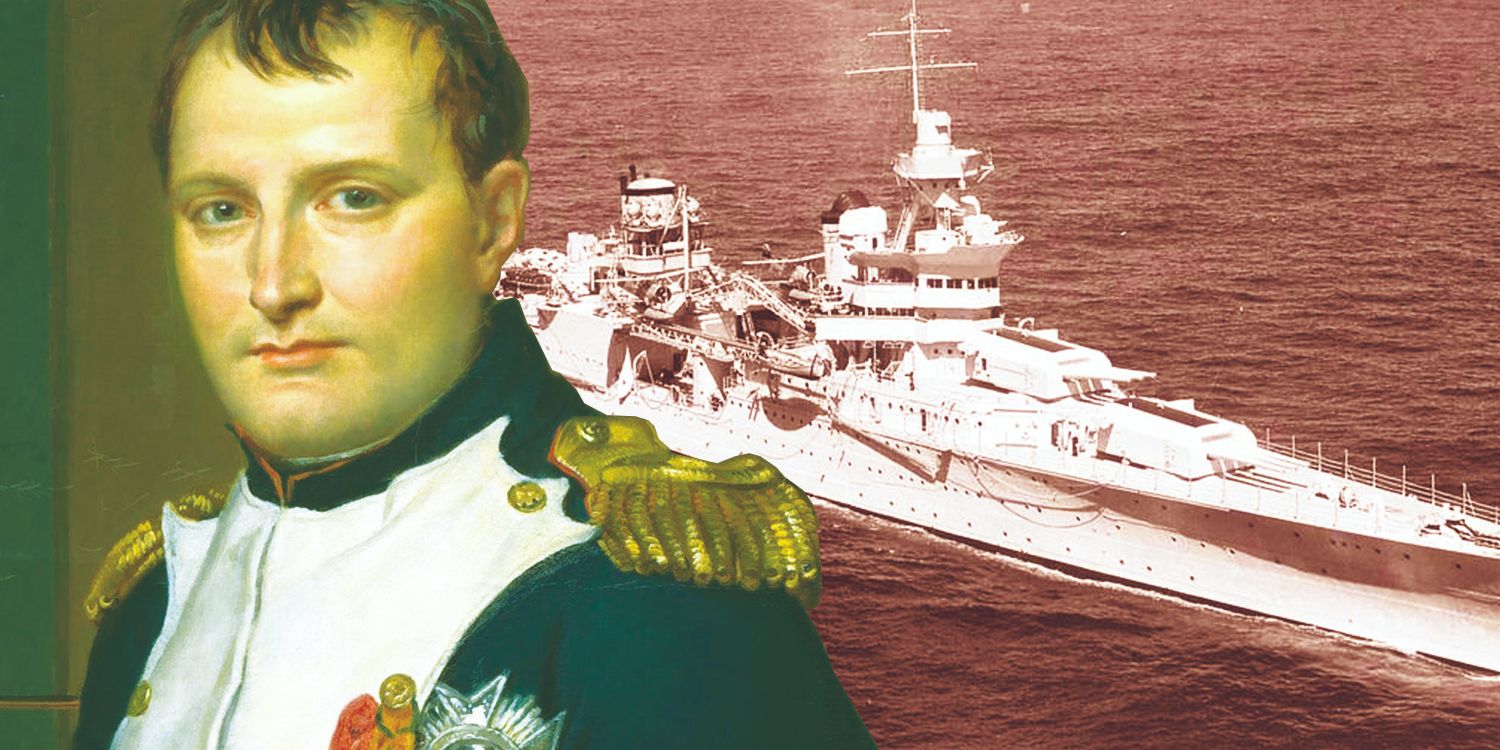
The fascinating stories in these war books would not only make for great films, but could lay the foundations for incredible new war movie franchises.
10 Flyboys: A True Story of Courage
James bradley.
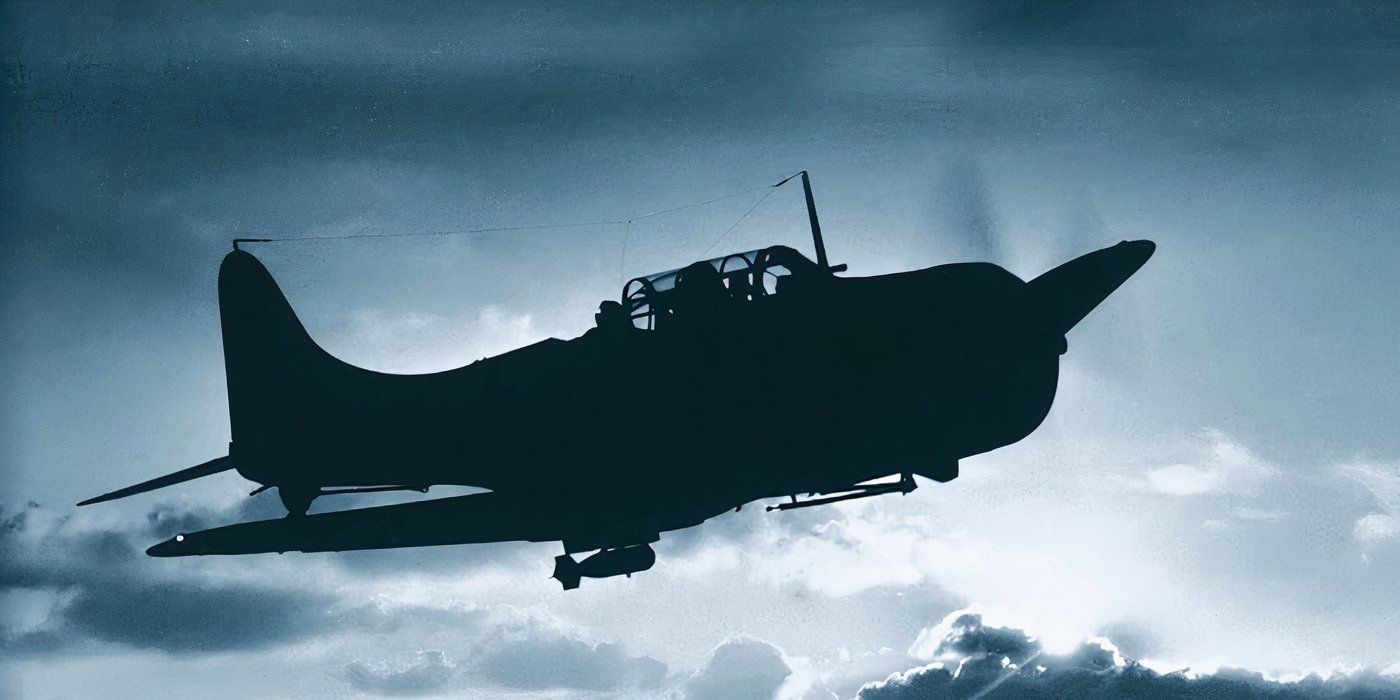
In the early 1940s, nine American Marine and Navy pilots volunteered to fly daring raids over Japanese territory, their mission to shoot down Japanese communications towers on the Ogasawara Islands. During the mission, they were shot down over the Japanese island of Chichi-jima. Of the nine men who went into the water, only one was picked up by a U.S. submarine. That man, George H.W. Bush, later became the 41st President of the United States. As for his eight comrades, they were captured and endured horrific acts of torture and cannibalism by their captors until they were executed months later.
James Bradley's novel, Flyboys: A True Story of Courage , painstakingly recreates the events of these eight lost men and the lone survivor through witness interviews, classified documents, and historical archives. Flyboys does not shy away from the brutality of the story, with Bradley taking an unflinching look at the history that led to the Japanese soldiers' inhumane treatment of American POWs and how American westward expansion played into it decades earlier. While the focus is on the young men who were shot down, it tells a broader story about two nations' histories that brought them to loggerheads during WWII.
9 Storm of Steel
Ernst jünger.
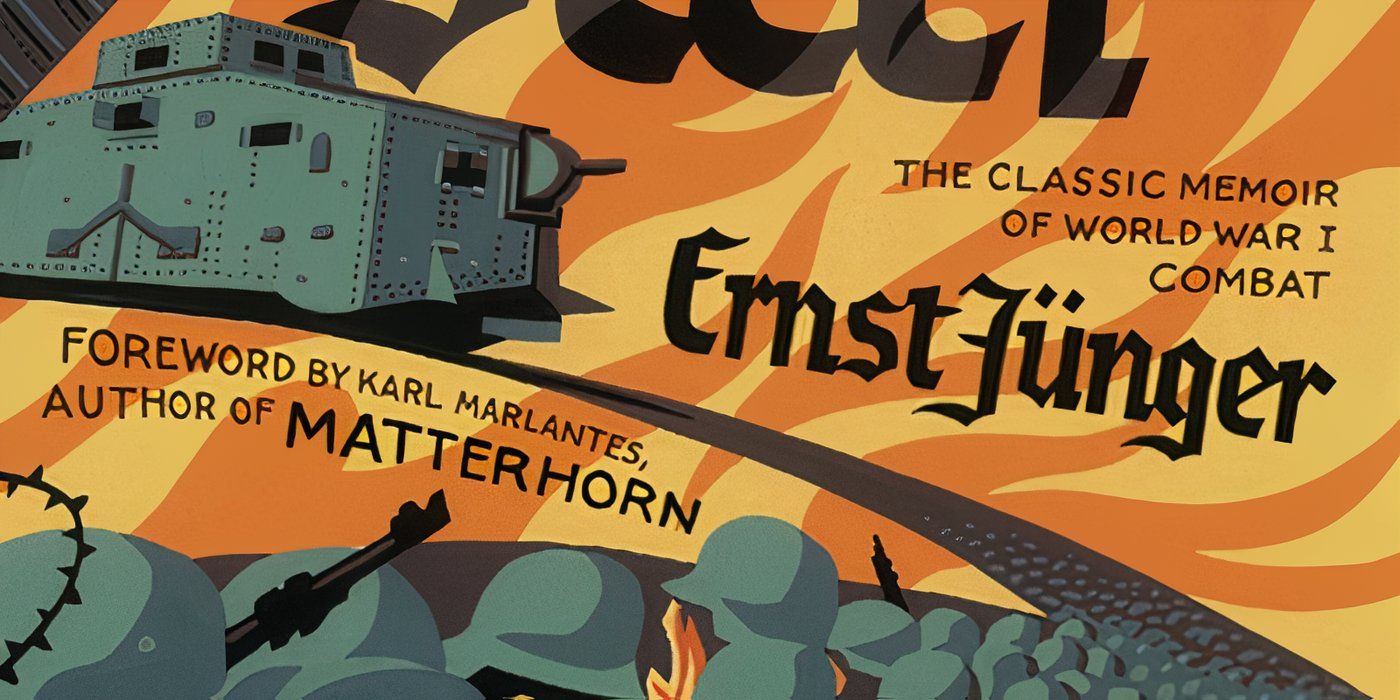
Most soldiers' memoirs tend to focus on the horrors of war and carry a strong thread of regret, even married with duty. German soldier Ernst Jünger's World War 1 memoir Storm of Steel , however, is one of the few in which the writer seems to have embraced every second of war. As a young German soldier, Jünger painstakingly documents his experience fighting in the trenches and watching his comrades fall while he survived British shelling and led daring raids. Through it all, his sense of purpose kept him zealously committed to his duty.
Storm of Steel is one of the more interesting war memoirs in that, despite how young he was at the time, Jünger was also incredibly self-aware – sometimes disturbingly so. To his mind, World War I was not just a global conflict, but also a war he must fight within himself to withstand the life-or-death scenarios in which he found himself. With every mission that ended in his survival, he became more determined to push himself to his limits, defying the death he was sure would come for him.
8 One Bullet Away: The Making Of A Marine Officer
Nathaniel fick.
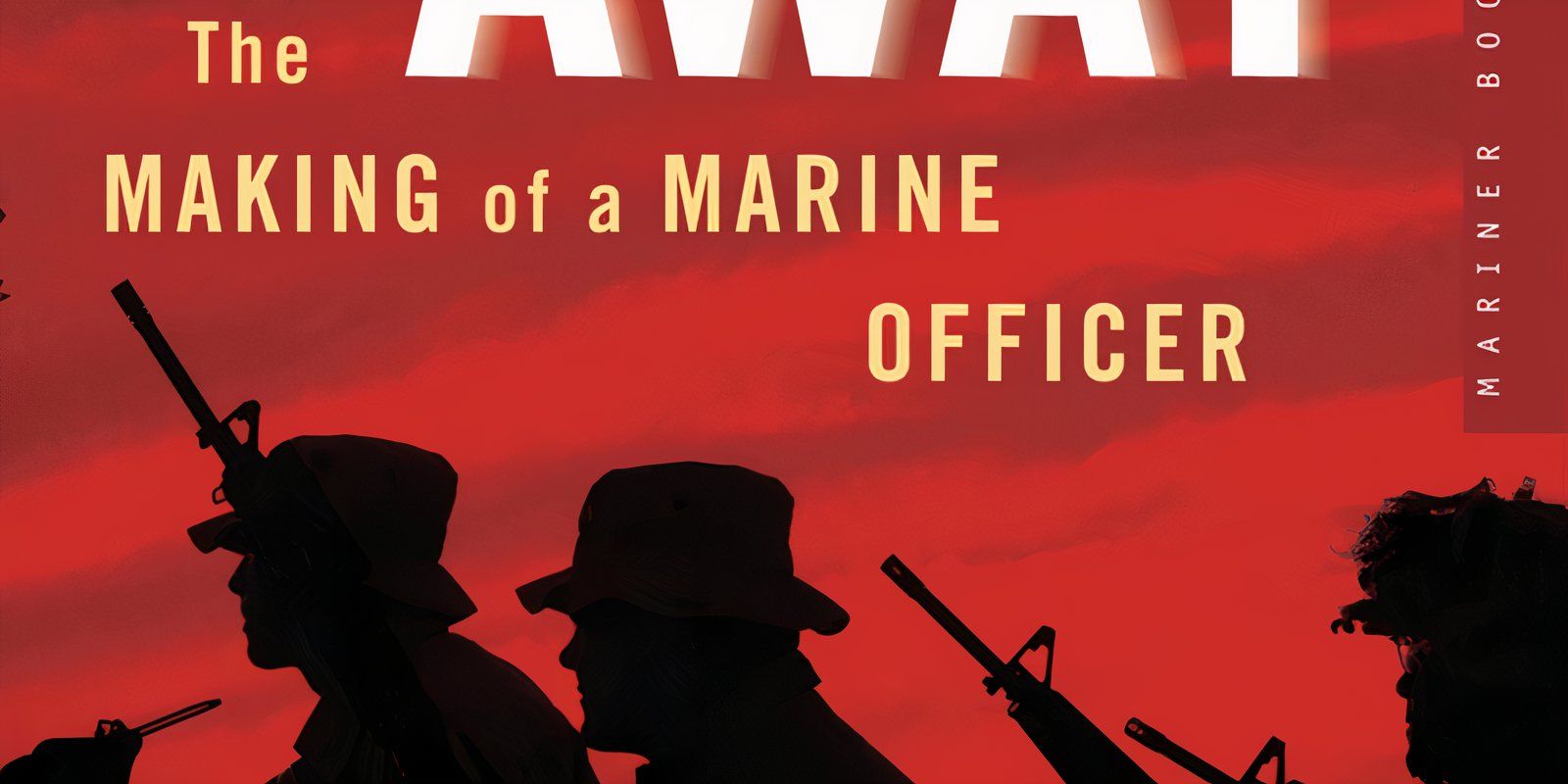
The Marines are known as " the few, the proud ," but not many civilians know there's an even more elite unit within the Marine Corps: the Recon Marines. About 10-20 people flunk out of Marines boot camp, and only 1 of every 100 Marine soldiers qualify to be part of a Recon force. Captain Nathan Fick was one of them, serving in the Marines’ First Recon Battalion with tours in Afghanistan and Iraq. He's responsible for the safety of 22 elite Marines under his command, and as they go into battle, he's determined to see every one of them home safely.
What sets One Bullet Away apart is that it underscores how Fick's rigorous training was only part of his success once he was shipped overseas to the field of battle. He also needed luck, common sense, and to know when his superiors were not seeing things clearly. It doesn't undermine the training, though. Fick takes readers through what it takes to be a Marine with his firsthand account, starting with his very first brutal summer at Quantico. The memoir details the elite, high-level training not just of the Marines, but also of the Recon force, which he joined four years into his career as a Marine, and of what they endured while deployed.
7 Band of Brothers: E Company, 506th Regiment, 101st Airborne from Normandy to Hitler's Eagle's Nest
Stephen e. ambrose.
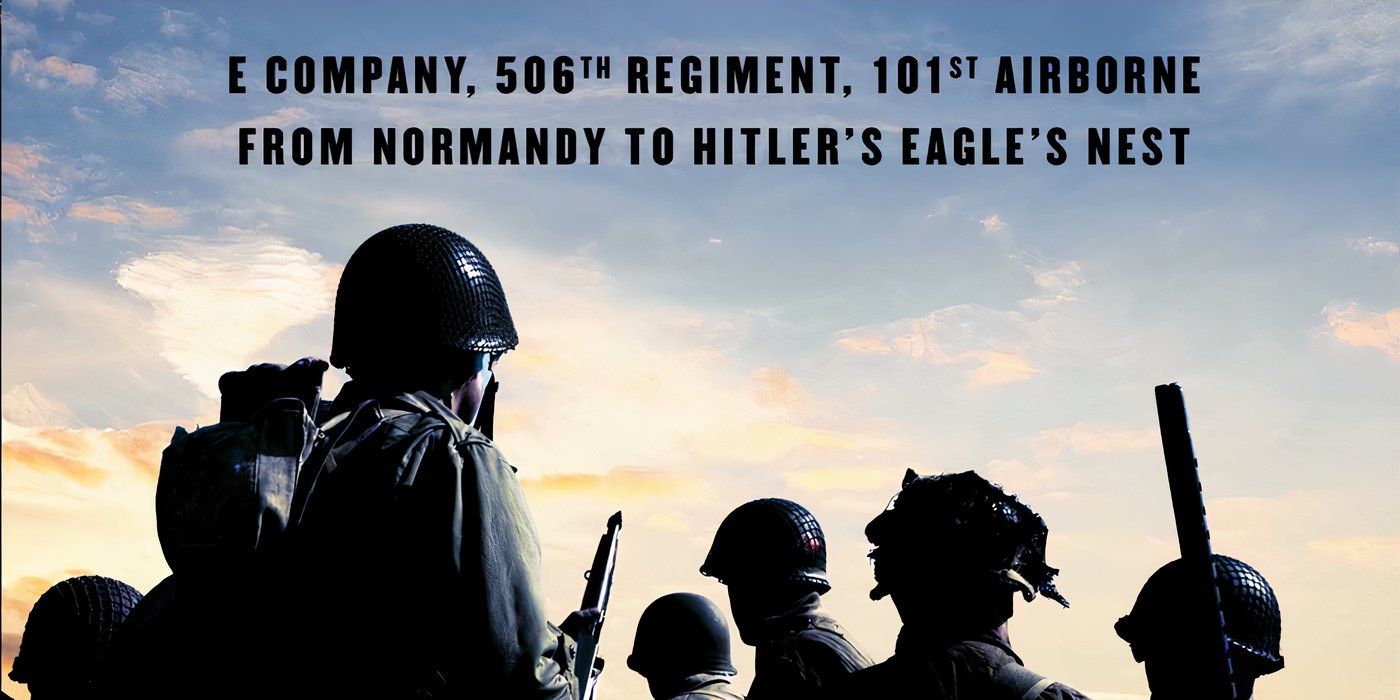
Stephen E. Ambrose's Band of Brothers may be one of the best-known true history war books ever written thanks to Stephen Spielberg and Tom Hanks' iconic 2001 miniseries adaptation. To write his book, Ambrose conducted interviews with the WWII veterans of E Company , 2nd Battalion, 506th Parachute Infantry Regiment of the 101st Airborne Division. With their help and feedback, Ambrose said, " We have come as close to the true story of Easy Company as possible ."
And what a story it is. Ambrose's novel is so poignant because it is a war book that doesn't focus on war. While it certainly incorporates the battles in which the men fought in the European Theater and the larger horrors of World War II, what makes Band of Brothers such an enduring read is that the main focus is on the men and their lives. Through his interviews and later his writing, Ambrose details each man of Easy Company with complexity and precision, capturing exactly who they were then. The result is arguably one of the greatest memorials to veterans ever penned.
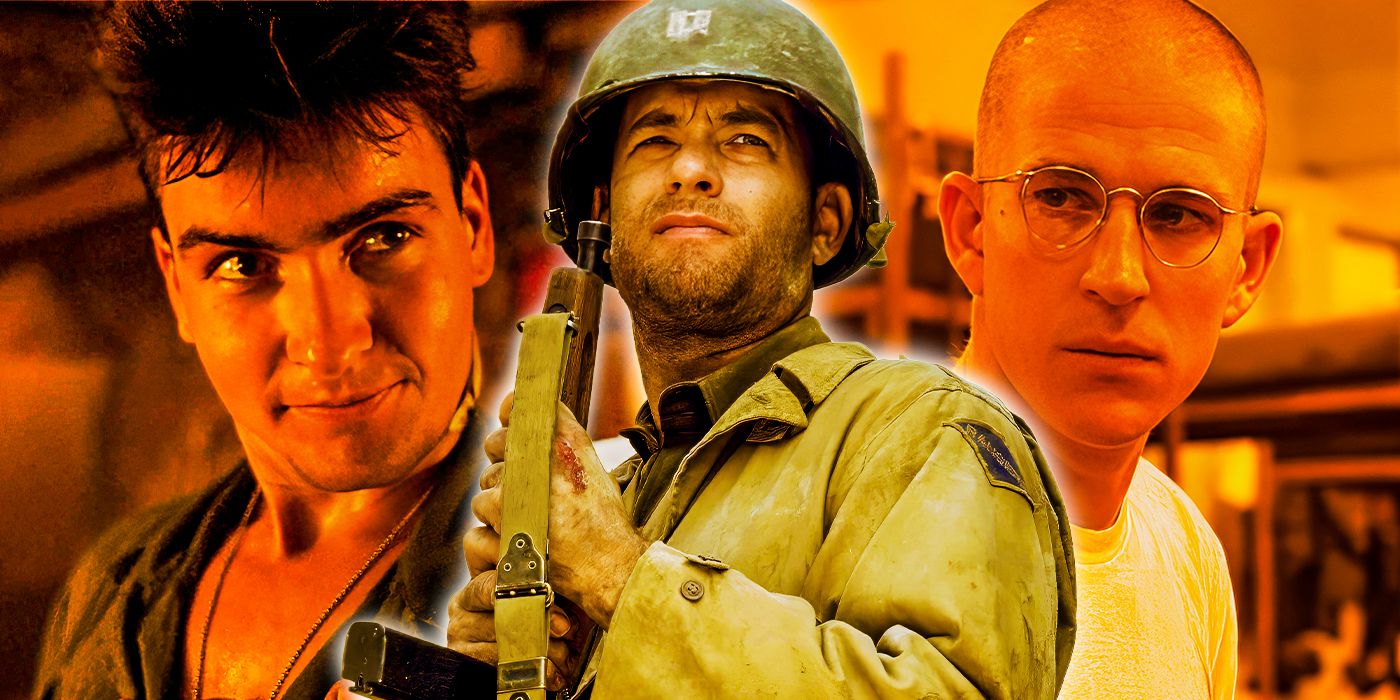
While most war movies are criticized for their inaccuracy, there are many that got various details right, earning the praise of military experts.
6 The Forgotten 500: The Untold Story of the Men Who Risked All for the Greatest Rescue Mission of World War II
Gregory a. freeman.
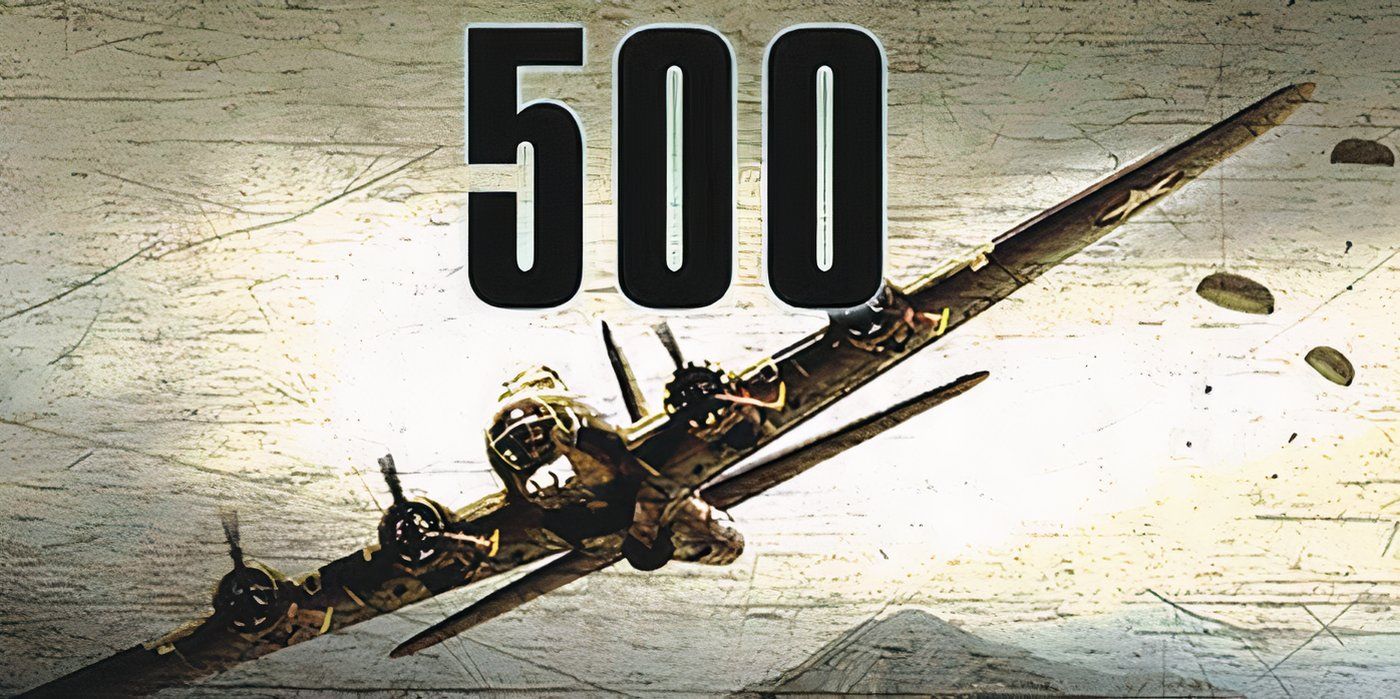
Many stories from World War II have endured to take on near-mythological status in American military lore: D-Day and the storming of Normandy, the Christmas ceasefire, the Tuskegee Airmen, and more. A lesser-known story is one of the most inventive and daring rescue missions of not just the Second World War, but arguably any war. When hundreds of American airmen were shot down in Nazi-occupied Yugoslavia, local Serbian peasants were determined to hide the soldiers in their homes, risking not just the soldiers' lives, but theirs and their families' should the Nazis catch them.
What follows is an incredible story detailed in Gregory A. Freeman's The Forgotten 500 . In 1944, Operation Halyard was greenlit as a rescue operation to retrieve the 500 American soldiers. The mission: Fly cargo planes behind enemy lines to rescue the stranded, starving soldiers, without being shot down. The catch: The stranded soldiers had to construct runways for the cargo planes to land on, without any tools, without calling attention to the Nazis, and without putting the selfless villagers in danger. Until Freeman's book, the story was little known thanks to the documents about it being classified, so it's well worth a read to learn of the most daring operation no one knew about.
5 A Bright Shining Lie
Neil sheehan.
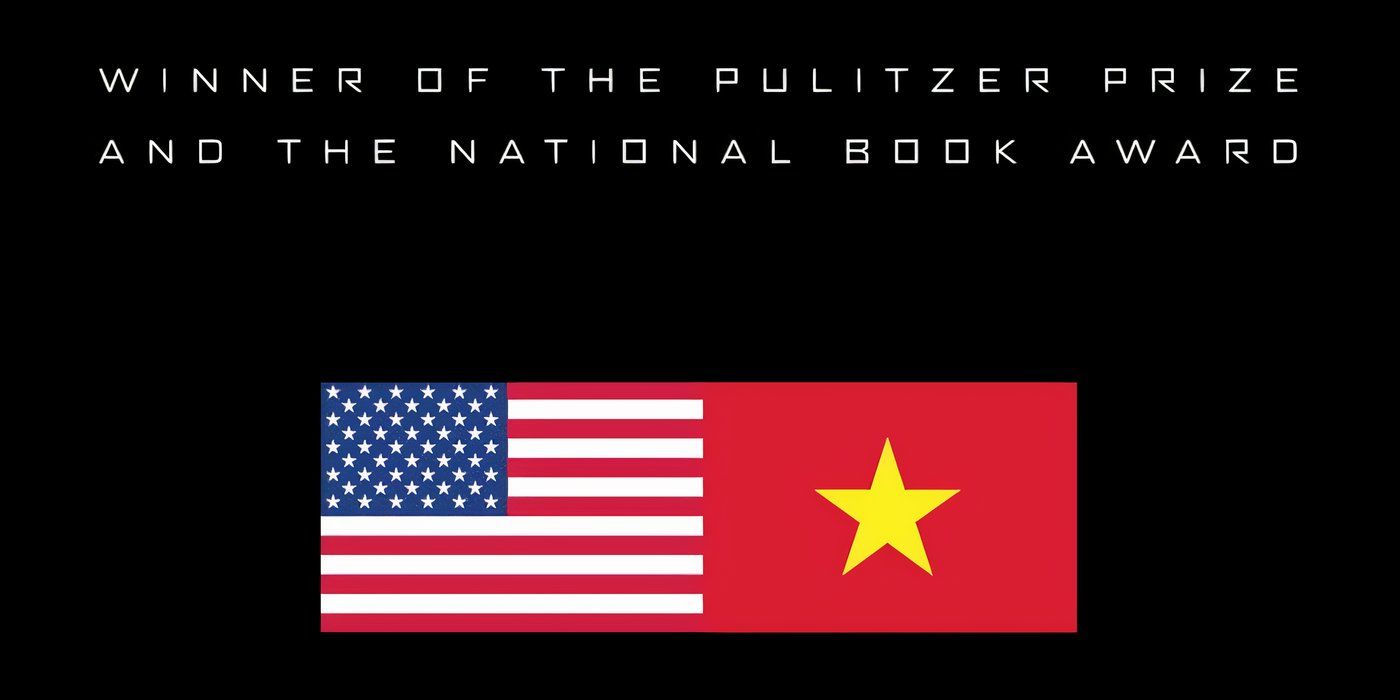
In 1962, U.S. Army Lieutenant Colonel John Paul Vann was assigned to Vietnam to be an advisor to the Saigon regime of South Vietnam and guide them in military strategy and tactics. What followed, before the United States even officially entered the war, was a corrupt and shambolic effort by the regime and an inflexible, incompetent U.S. strategy that left Vann frustrated and furious. Upon his return to Vietnam in 1965, this time to lead men into battle, Vann's attempts to fix a broken military strategy were eventually ground down by the futility of the U.S. effort in the jungles of Vietnam.
Generations removed from the Vietnam War, it's easy to see now what a shortsighted disaster it was. While plenty of people protested the war back then, what none of them seemed to realize was that the soldiers stuck in hell halfway across the world also knew how futile it was. Neil Sheehan pulls no punches in A Bright Shining Lie . It's a sprawling account of the foolishness of the Vietnam War from the start, and how the U.S.'s arrogance and ignorance got plenty of good men killed in a war that couldn't be won. It's a sobering, warts-and-all lesson about the dangers of ignoring humility and reason in war.
4 A Vietcong Memoir
Truong nhu tang.
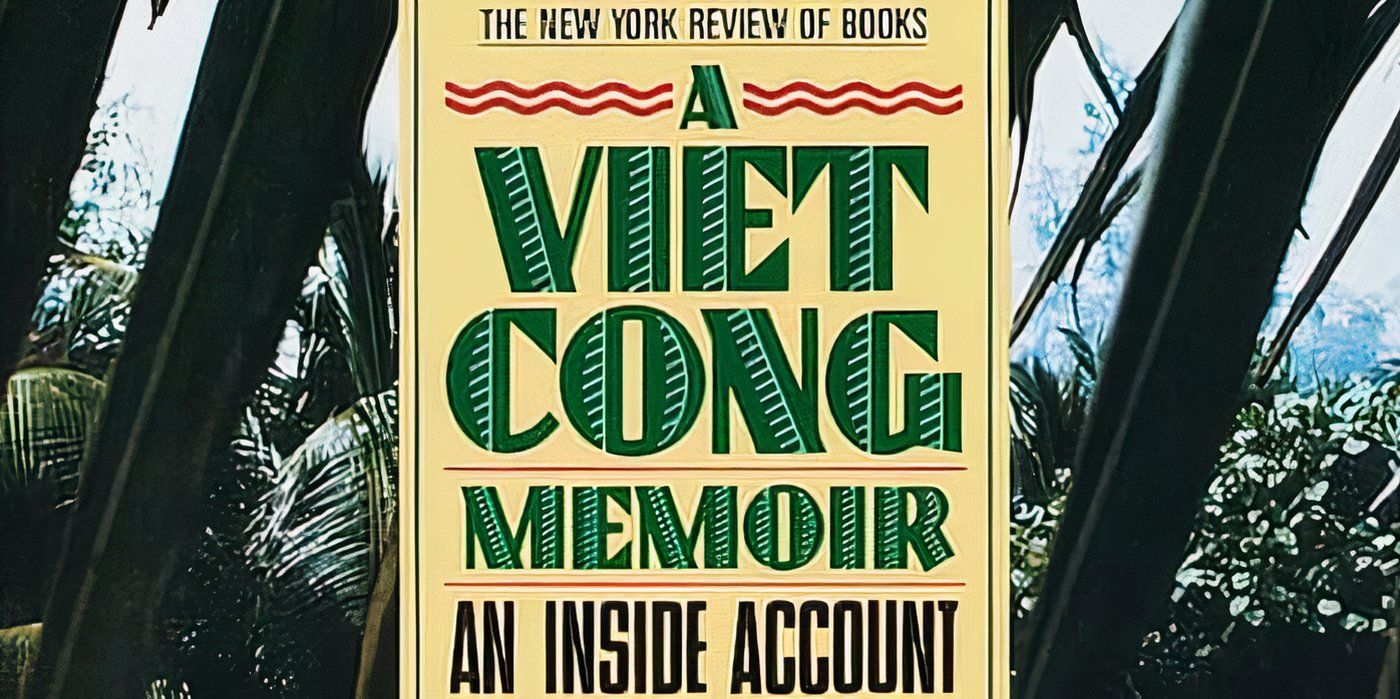
On the flip side of Sheehan's account of Vann's perspective is one from the perspective of a Viet Cong guerrilla fighter. As a young college student living in Paris, Truong Nhu Tang once met Ho Chi Minh, the legendary North Vietnamese communist revolutionary and President of the Democratic Republic of Vietnam for almost 25 years. That meeting inspired Tang to join the Viet Cong as a soldier to fight for his country, eventually rising to the elite rank of Minister of Justice, where he became a key figure in the fight to liberate their way of life.
What's fascinating, however, is that, just like Vann on the opposing side, Tang soon grew disillusioned with the Vietnam War. As he witnessed the brutality of the long, drawn-out conflict that had turned into a no-winner war of attrition, he became increasingly embittered about the cause he had once championed. By the end of the war, he had fled back to Paris, where he lived in exile. A Vietcong Memoir offers an important perspective on the Vietnam War and is the most complementary bookend to A Bright Shining Lie .
Sebastian Junger
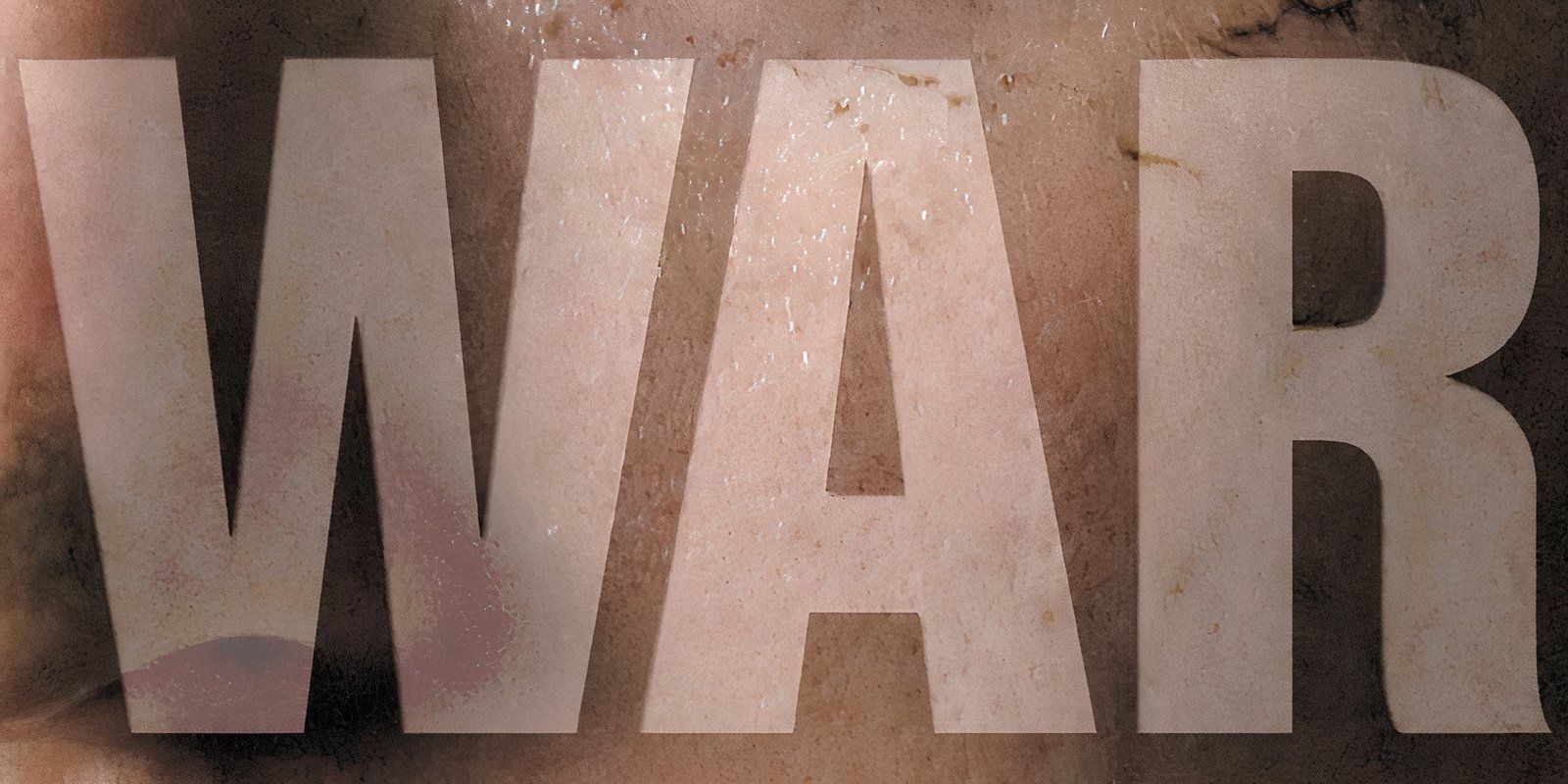
Much like the Vietnam War, the War in Afghanistan is now widely understood to have been an utter failure, a 20-year fight U.S. troops and its allies could never win. The men and women who fought came back changed and often broken, frustrated by the futility of the conflict and of the unpredictability of the guerrilla tactics of the fighters they faced. Sebastian Junger was there for most of it, embedded in Afghanistan as a war correspondent while covering the war for over a decade. Much of his time was spent embedded with the U.S. Army 173rd Airborne.
Junger took the material he'd collected from his time with the 173rd and turned it into the novel War . The novel follows the intimate bonds forged between the soldiers stationed in Afghanistan's Korengal Valley. Their commitment to each other, and the valor and bravery with which the platoon fought over the 15 months the book covers is an intimate look not just at modern combat, but also at the brotherhood that forms between soldiers during war. Junger's time with the 173rd also was the basis of the Academy Award-winning documentary Restrepo , which serves as an excellent companion to War .
2 A Blaze of Glory
Jeff shaara.
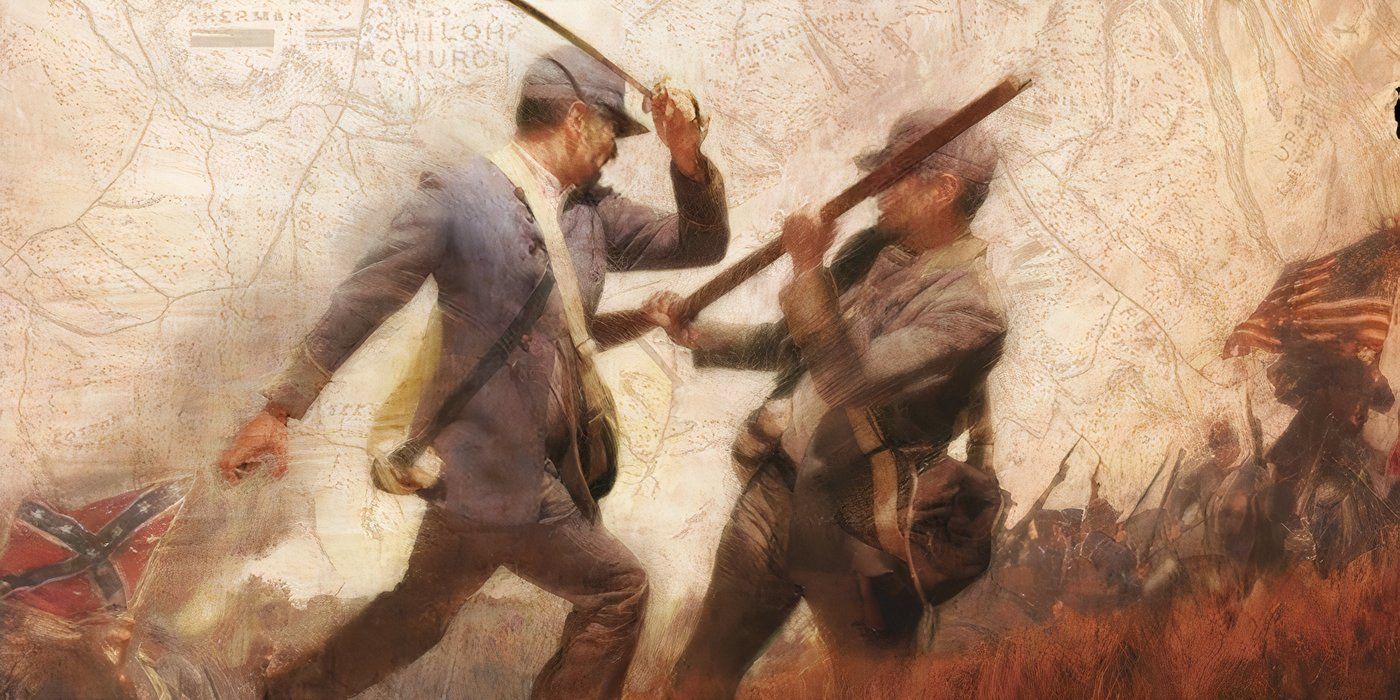
It was Spring 1962 and the Confederate Army fighting in the Western Theater of the Civil War was on the verge of total collapse. General Albert Sidney Johnston was desperate to turn the tide, hatching a bold plan to take the fight to the Union Army in a surprise attack before it could be resupplied and reinforced with more troops. For one day, Johnston's audacious plan seemed to be paying off as the Confederates gained the upper hand. The tide turned the next day when Ulysses S. Grant's army was reinforced faster than Johnston anticipated. The events became known as the Battle of Shiloh, one of the bloodiest battles in the Civil War.
In A Blaze of Glory , author and historian Jeff Shaara does a tremendous job of pulling together hundreds of sources and meticulous research. His novel painstakingly recreates the events that led up to Shiloh, and the pivotal moments therein of both commanders over the two-day battle. Both commanders showed daring and ingenuity, but the Battle of Shiloh was unforgiving. By the end of the second day, nearly 24,000 men from both sides were dead, including Johnston. Shaara's novel is the most comprehensive look to date at one of the most pivotal battles of the war, taking readers inside the chaos and horror of Shiloh.
1 Memoir of a Revolutionary Soldier: The Narrative of Joseph Plumb Martin
Joseph plumb martin.
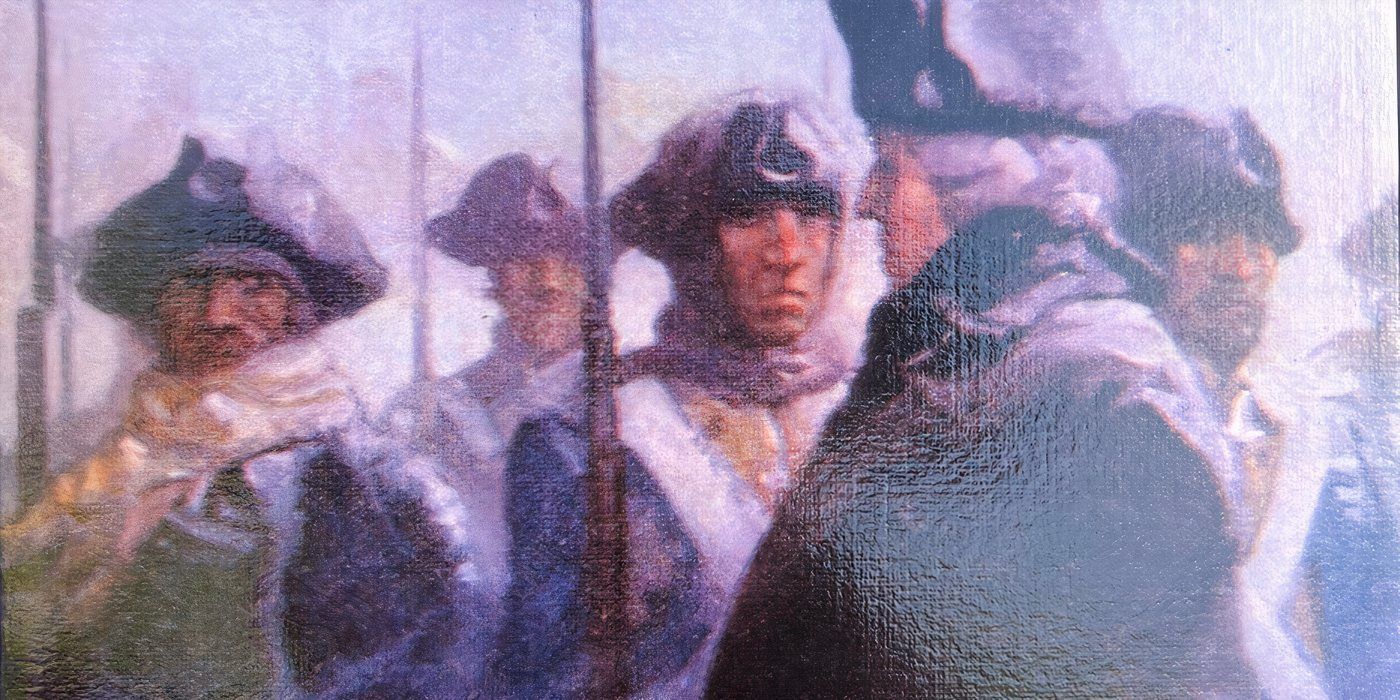
It's rare to find whole and complete memoirs from as far back as the Revolutionary War, specifically from normal people and regular soldiers, which is what makes Joseph Plumb Martin's Memoir of a Revolutionary Soldier so special. Joseph Plumb Martin was just a young and naive farmboy and teenager when he left his home in 1775 to join the Continental Army. He'd spend the next eight years fighting under George Washington, crossing the upstart colonies fighting to become a new country.
It wasn't until he was 70 that Martin could bring himself to sit down and write out his memories. What follows is a gripping account – and the most complete one available – from a regular soldier in the war. Memoir of a Revolutionary Soldier is a harrowing read that does not shy away from the horrors of war: brutal death and agonizing injuries, marching through bitter cold, and honesty about sometimes incompetent leadership. Far from the protected and wealthy Founding Fathers, Martin's work is a firsthand lesson about what the on-the-ground soldiers endured to birth the country that would become the United States of America.
All of the books on this list can be purchased from Amazon and at any major retailer.
- International
- Education Jobs
- Schools directory
- Resources Education Jobs Schools directory News Search
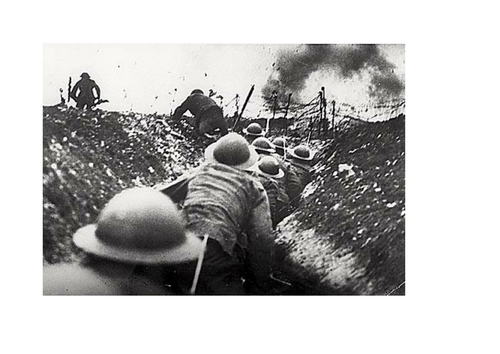
Creative Writing- war
Subject: Creative writing
Age range: 11-14
Resource type: Worksheet/Activity
Last updated
22 February 2018
- Share through email
- Share through twitter
- Share through linkedin
- Share through facebook
- Share through pinterest

Creative Commons "Attribution"
Your rating is required to reflect your happiness.
It's good to leave some feedback.
Something went wrong, please try again later.
marinarichardshcc
Thank you for this great resource .
Empty reply does not make any sense for the end user
Thanks for this, I used it as a differentiated ww1 assessment for a year 8 girl with severe learning difficulties.
Thank you. I used with Y9 intervention group to develop language and writing skills. It fits really nicely with the History curriculum too.
Report this resource to let us know if it violates our terms and conditions. Our customer service team will review your report and will be in touch.
Not quite what you were looking for? Search by keyword to find the right resource:

IMAGES
VIDEO
COMMENTS
Writing Prompts About War. In the throes of World War II, a soldier writes letters to his beloved. Fifty years later, a young woman stumbles upon these letters in an old trunk and feels an irresistible urge to respond, attempting to heal old wounds and bridge the chasm of time. What messages does she pen, and what mysteries unfold as she delves ...
Historical Military Fiction Prompts 15. A soldier helps start what would become known as the World War I Christmas Soccer Game. Write a fictionalized account of how the famous soccer game happened during the Christmas Armistice of World War I. Make your protagonist the person who suggests the soccer game and describe how he felt in the battles leading up to the Christmas Armistice.
Creating conflict in your story is essential for capturing your readers' interest and driving your narrative forward. In order to reveal character motivations and examine deeper meanings within your story, the protagonist must be presented with a challenge derived from conflict. Here are 120 story conflict ideas and examples based on the most common types of conflicts in fiction. From ...
This article about writing war stories previously appeared in the January/February 2020 issue of Writer's Digest. Writing accurately and truthfully about war is never easy. Writing about conflicts that occurred decades and even centuries earlier is even more difficult. WD reached out to Mark Bowden, C.J. Chivers, and Nathaniel Philbrick to ...
Today's prompts include selections from the book 1200 Creative Writing Prompts. Enjoy! Nonfiction writers are obviously inspired by the real world, but fiction writers and poets also take inspiration from real people and events. Wars, scandals, scientific advances, and famous figures in history have all been represented in every form of writing.
Defining A War Book. Fiction Versus Nonfiction. How To Write A Book About War: Things To Include. Step By Step Guide. #1 - Define Your Primary Focus. #2 - Don't Forget About All Types Of Conflict. #3 - Use The Senses To Showcase Emotion. #4 - Understand What You're Writing And How To Write It. #5 - Add Humanity To Common Tropes.
Buzzell's My War, written in a style reminiscent of Hunter S. Thompson and Allen Ginsberg, is fueled by an antiauthority, punk-rock attitude. Esquire magazine hailed the memoir as "the most extraordinary writing yet produced by a soldier of the Iraq war.". My War follows Buzzell, a bored twenty-six-year-old high school graduate from ...
'Long Live War' by Ishaabyha Tripathi. As a piece of creative writing this entry focusses on one simple idea and uses this to epitomise the writer's experience of the war away from the Western Front, where the majority of troops on both sides were colonial, and many of them - as described - not English speakers. The entry also manages ...
Contemporary Writing on War and Conflict. This project examines the contemporary war experience as reflected by writers, poets, journalists and bloggers, and interrogate how we write about war and conflict today in contrast to the writing that was written on WW1. Thought pieces from leading contemporary UK writers are a starting point for ...
Source: Wikimedia Commons — Public Domain. One of the sad truths of humanity is that there always seems to be a war going on somewhere. Norwich University notes that as recently as 2015, there were 43 limited or full-scale wars going on in the world at large. In our work as writers, it often falls to us to determine how (and why) to write about war.
To create a captivating war novel, consider the following tips: Conduct extensive research on the historical context, military tactics, and cultural nuances of the era to ensure your story is authentic and accurate. Develop engaging and complex characters with distinct personalities, motivations, and backstories that readers can connect with.
The Best War Writing recommended by Kate McLoughlin. War writing extends to all sorts of genres, including blogs and Twitter. Oxford University's Professor Kate McLoughlin, author of Authoring War: The Literary Representation of War from the Iliad to Iraq recommends some of her favourite books of war writing.. Interview by Beatrice Wilford
This guide from First Draft Pro explores the conventions, obligatory scenes, and tips for writing a successful war novel. 6 Tips on Writing a War Story - Edit911 Editing Service; War stories are multifaceted, emotional, and full of conflict. War is a popular and captivating genre. However, writing about war is challenging.
If they can complete their essay in 450 words or less, students can even submit their writing to the NYT Student Editorial Contest! #3 ReflectionWarm-up. My students are not just interested in the War in Ukraine, they are stressed about it. Though located on another continent, the internet makes the conflict feel close.
1. War Is Not Part of Human Nature by R. Brian Ferguson. "Debate over war and human nature will not soon be resolved. The idea that intensive, high-casualty violence was ubiquitous throughout prehistory has many backers. It has cultural resonance for those who are sure that we as a species naturally tilt toward war.
War plays a large part in history and finding words to describe war is important. Explore our list of powerful words for types, strategies and more. Dictionary Thesaurus Sentences Grammar ... If you're writing a paper or story that discusses war, it's critical that you choose the right descriptive words to convey the aspects of war ...
Creative Writing - War. We all heard the disquieting crunch, off in the far distance. For a few seconds, we remained still, sinking deeper into the mud, anticipating another sound to calm our nerves. Instead, a fraudulent silence followed. General Loft's reaction was delayed; his hand shot up immediately as he remembered his position.
War on the Rocks helped transform and expand the publication landscape in exciting ways. In the years since, writing for War on the Rocks allowed me to pursue what a good friend calls my "epistolary" style: more conversational, open-ended, quizzical, playful, even as the issues I care about are deadly serious. I still occasionally write the ...
Expert Answers. In preparation for writing on a war scene, one may wish to peruse the writings of professionals for examples. Such works as Here is Your War and Brave Men by World War II's ...
For myself, I've read a few war-biographies to gain a better understanding of the sort of highly personal combat that was experienced during the World War II, Vietnam and Korean wars. While the American Civil War and World War I both had close engagements, combat was on a somewhat grander scale with large unit maneuvers being the order of the day.
This mini series of 'War Time Writing' uses emotions to help engage and interest students and encourage them to write well. This mini series of lessons helps students to write a World War One Diary Entry and Newspaper Article using emotive writing tips and helps improve their creative writing. Sometimes children find it easier and more ...
Creative writing involving war. Tom Burgess Yr 10 set 1 English Coursework. Creative Writing. The wailing sirens struck fear into the struggling crowd of panicking civilians. The adrenaline rush filled me as I barged passed all the strangers and knocked an old man off his feet, he tripped into the puddle beneath him launching muddy water into ...
Most soldiers' memoirs tend to focus on the horrors of war and carry a strong thread of regret, even married with duty. German soldier Ernst Jünger's World War 1 memoir Storm of Steel, however, is one of the few in which the writer seems to have embraced every second of war.As a young German soldier, Jünger painstakingly documents his experience fighting in the trenches and watching his ...
World War 1 Creative Writing. Decent Essays. 392 Words. 2 Pages. Open Document. As I walked through the rugged trenches of World War 1 a bullet flew over my head.I jumped for shelter.As soon as that happened a cluster of German soilders came sprinting towards my position.They were trying to infiltrate my trench.Then I woke up it was a flashback ...
Creative Writing- war. Subject: Creative writing. Age range: 11-14. Resource type: Worksheet/Activity. File previews. docx, 65.47 KB. This is a good resource to provoke imagination and discussion. I used this resource with a group of students who have speech and language difficulties. This activity can be used as a starter or as a whole lesson.
J ulie McKiernan's engaging talk and subsequent creative writing session offered participants a deeper understanding of the sacrifices made by those who fought in the war. Attendees were ...